#Does maturity and nuance not matter anymore
Explore tagged Tumblr posts
Text
^^^
again i say to you
if this man would just let the percy series mature and dig deeper into the emotional arcs he presents in chalice and wrath instead of hopping from one kooky adventure to the next and undermining any story depth with fart and piss jokes and blatant flagging to the disney+ audience, we could have had a very good set of stories on our hands
but NO
percy's rage issues, grief, trauma, and just the general angst of being an older teenager on the cusp of a huge life change are all there and every time the story touches them, it's like RR gets electrocuted and told to get back to Conflict Free Therapy Speak zone before things get too messy
additionally, the third act upping the stakes to Oh Shit We're Gonna Die doesn't work if we already know 1) everyone lives and 2) PERCY GETS INTO COLLEGE at the end of this. the whole point of the series has already been decided!! there are no stakes with your main plot or any of the bullshit mini quests! the opportunity to go for a deep dive character book is there and waiting and ready
but NOOOOOOOOO
gotta make sure all of our main characters have been peed on instead, it's fine
#i am beating the horse's decaying corpse at this point#but the failure to let percy mature when the writing itself is clearly calling for it is just insane#let percy and annabeth and grover have actual interpersonal confict with each other and work it out in a real way#if none of the mythological stakes matter make sure the personal ones do#we can still have fun and be funny along the way!#rr crit#pjo#percy jackson#percy jackon and the olympians#book talk with jess#credit to you#Percy has been to literal Greek hell#Does maturity and nuance not matter anymore#like rick riordan hit gold with the original series how has he lost the grasp on his own characters?? his own plot??#where is my depth from the books#where are the stakes#it feels so empty#all i feel is pain#hopefully if i’ve pissed people off now they understand why#The characters have lost their sense of self#There’s so much trauma being ignored by Riordan
196 notes
·
View notes
Text
I think the reason for all that discourse in the JJK fandom is that we had some expectations about what this story would be about, and we were wrong. I'd say it was our fault for having them, because Gege had his own story in mind and it isn't our role to tell him what to write/draw. But I'd also say that we were misled into having those expectations and then being deceived, because shock value is fun.
(I'm not in the AOT fandom so maybe I'm 100% wrong, in which case don't pay attention to me. I'm just rambling I'm not trying to make a point)
See there's not such a thing in Attack On Titans. I mean I know people are arguing whether a decision was good or bad or a character development was positive or negative, but no one is rioting the way JJK readers are even when someone dies, kills, or does worse (they do start a genocide lol). Because in AOT you know since the beginning what this story is about : surviving, war, and liberty. With time you learn that it's also about racism, destiny and injustice. But the story starts with death and blood and it never calms down, characters keep dying or getting hurt and no one's safe all along the story. So you just know it'd end the same way, you know what to expect, that power of friendship won't save anyone here.
But Jujutsu Kaisen is different, because it has all the codes of a basic Shonen. Everyone was comparing it to Naruto during the 1st season so you would believe it'd follow the same path. Of course there's fights and fails and suffering and death, because it's necessary for the growth of the protagonist. He'd learn he's not strong enough and he'd try harder and mature more and be better. Jujutsu Kaisen makes you think it's your One Piece-type manga where 1 person dies every 4 arcs and the main team survives everything, even when it looks impossible.
And then Shibuya happens and you're shocked because it's way to early to kill so many valuable characters in a row. Usually that kind of massacre happens during Big War arcs like in MHA. At first you think it's an interesting writing choice because it changes from other mangas, and you wonder how the main character will evolve from that. But then the training arc never happens, because shit keeps falling on them and there's a pile of deads and you start to wonder when it'd stop. Spoilers : it doesn't.
So at some point you realize it. This isn't a classical shonen. This isn't an happy-ending after a hard fight kind of story. There's no power of friendship to save them, there's no important moral path to keep following no matter what (like "I won't do to you what you did to me because it'd mean that I'm the same" no it doesn't work here), and there's not even a chance to run away from that cursed role no one wants to bear. There's no one protecting the kids anymore. The MC isn't strong enough and the mentors are dead and close friends are off-fight and the one person able to end this has to make the horrendous choice to give up his humanity.
In AOT, you were shocked, but it felt logical in the sense of where the story was leading you from the beginning. In JJK, you feel betrayed and manipulated because everything made you think about those other mangas where people ended up fine, but it was just a cover.
Honestly you COULD have guessed it'd end that way. Many people did. You just ignored it.
You thought Junpei's death was an exception, the Major Point for Yuuji's development, the Shock Value Kill to put some depth nuance in the story. But in reality it was a warning, a taste of the future. There WERE signs after all, and Gege never pretended to write another Naruto. You were so used to the classical shonen that you read the signs and fell for the trick.
JJK has never been a nice story from the beginning, Sukuna was at the center of every event since the beginning. You can dislike what is happening but you cannot say it's bad, as in a scenaristic choice. Gege is a writing genius and unfortunately he's also pure evil.
You shouldn't have trusted a one-eyed cat after all.
#jjk#jjk spoilers#jjk manga spoilers#analysis#rambling#jujutsu kaisen manga#gege akutami#jjk analysis#By You I meant Me obviously. I'm the one who got tricked. I'm the one crying on the sideway.#i don't want AOT discourse on this post I don't really care I'm simply spilling my thoughts on JJK
62 notes
·
View notes
Text
So while I'm Saying Shit, I also have a problem with this idea that El was upset that Mike wasn't saying I love you specifically because her love language is words of affirmation so she really needed to hear it? I mean, first of all I think the idea of love languages is mostly useful as a quick generalized way to discuss how we respond to and express affection—a messy nuanced human behavior thing that is hard to talk about, and the show is written with that nuance, but even then I don't think El particularly craves or requires words to feel loved anymore than anyone else does. I think in s4 she was really just confused about why her boyfriend was refusing to say the word 'love' under any circumstance to her? Especially after she heard him say it once already and then she said it back to his face in response so its like, he said he loves me before and I let him know I feel the same and now he won't say it again? Not even as a way to end letters—a normal thing people do for someone who means much less to them than she supposedly does to him sooooooooooo like what's the fucking deal? The contents of the letters sure implies he holds a lot of affection for her and he brings her flowers in her favorite colors and ok we're in love and then he signs 'from' on the card and its like ????? like even as the audience you're supposed to be confused lol like he clearly has some kind of hang up I wonder what it is? Then after El smashes a girl's face in she thinks "oh yeah, the hang up is that he actually hates me because I'm evil haha lemme just start projecting real quick" and then, you know, s4 happens. I mean, it's not like she doesn't value words at all, I just don't think her relationship to them is particularly tied to her trauma like people say, or if anything, maybe she values them less because that's all Brenner would ever give her? Like, perhaps the big Love Confession hits the hardest because it came after Mike and company spent a week or whatever driving across the entire western united states to save her from the government. Idk, something to chew on.
Honestly, if anyone's love language is words its Mike lmao he's the one whos constantly telling El how amazing she is. He's also desperately trying to tell her he loves her in like 5 scenes (arguably succeeding except for not saying the actual word in most of them) before he actually does like, he wants to so bad it almost comes spilling out of his mouth against his will (except for that one time it does ha) he's just terrified of doing so because it would essentially be ripping his entire beating heart out of his chest and handing it to this powerful-in-every-way girl on a silver platter for her to do whatever she wants with—like crushing it into a fine paste in front of his eyes, killing him instantly and preventing him from having the strength to love anything ever again. Like, the other half of the love language thing is that you also speak the love language, meaning you are more likely to show affection by doing the thing you want for other people, and Mike does this waaaaay more than El does for anyone actually (something I would love to see her do more in s5 lowkey. Like, she was at a severe disadvantage before and was too busy dealing with her own shit to have a ton of emotional energy for anyone else so it makes sense, but we're matured now. I think now is the time for a heart-to-heart that goes both ways u kno).
If I wanted to be cute, I could argue that both Mike and El's main love language is actually acts of service. They're both little heroes who jump at the chance to do anything for the people they love with no regard for their own personal wellbeing. Also, adorably, the thing that gets them back together in s3 is Mike saving El from Billy, which El responds to by helping him and Lucas with the vending machine. One offering of m&ms later and we're back baybee it's the quiet understanding that no matter what they'll always be there for each other for meeee
If I'm not being cute I'm saying the idea that everyone has a main 'love language' is bullshit and you're gonna appreciate different things at different times and people are not that easily categorized but it's still a good jumping off point for discussion so—
Anyway El saves the world and Mike saves her and they're dying in each other's arms thank you for your time <3
36 notes
·
View notes
Note
Look, I’ve remained neutral throughout this. I used to be a fan of your content but you lost me at the rape fic. And I don’t think these people should be attacking you in this manner. That part isn’t justified. But at this point they are desperately trying to get their point across. There are some things you really need to self reflect on, but you won’t take any criticism because you are so incessantly sure you’re right. The truth of the matter is you’re not going to be right about everything no matter how sure you are. That’s what they are trying to tell you. And they are telling you not to speak so badly of characters they love that you throw rape accusations at, and that there are lines, characters behaviors, and ships/ship dynamics (see: rape, an abusive old man and the child he abducted) that are not justifiable even if you call it “nuance”, and that you can’t enforce your headcanons on others. They are simply enjoying a canonical ship, and you are self righteously denying/twisting canon to your desires, saying you know more than the actors who play these roles for years at a time and know the characters better than any fan ever could, and refusing to accept that people sometimes just enjoy canon without thinking about it too hard and calling them bad people for enjoying this ship while directly writing the same things you yourself criticize. So yes, that’s going to make people mad.

I used to be a fan of your content but you lost me at the rape fic.
The funny part is that when I wrote that fic (Not a rape fic, btw. Dubcon. Two different things.) I just had the Mindflayer behave exactly the way Patty behaves. Even copied a bunch of her lines, some of them word for word. Ironic, isn't it? Almost like I was trying to prove a point, or something 🤨
Also..."I used to be a fan"? Oh no. I'm crying over the loss. Can you see the tears on my cheeks. I'm definitely going to listen to you, [checks notes]...Anonymous Hate Sender #18923829. You've really reached me with this one, Anonymous Ex-Fan. <- That's sarcasm, btw. Just in case you didn't catch my drift: I don't care.
There are some things you really need to self reflect on...
That's not patronizing at all (/s). And I suppose you're the one qualified to tell me what I need to reflect on?

And they are telling you not to speak so badly of characters they love...
Too bad. They can block me and move on, like someone with even an ounce of maturity would. They don't own the characters, and I'm not on their payroll, so they can't tell me what I am and am not allowed to say. That is...unless they wanted to start paying me to stop talking 🤔

...you can’t enforce your headcanons on others. They are simply enjoying a canonical ship...
I never enforced my headcanons on anyone. I'm not the one going to them directly and telling them what they can and can't talk about or how they're allowed to talk about certain characters. I don't even really post in the Henry tag anymore, meaning they have to come to my blog to see my posts. Sounds like a personal problem to me. As in: "not my problem".
Try this on for size: They can't enforce their headcanons on me. I'm simply critiquing a ship that doesn't last past Act 1. And it's not like I'm tagging them in posts yelling at them for not agreeing with my view of canon. I keep to myself. So this really does sound like a personal problem on their end. Again, pay me or shut up. <- That goes for you too, O' Great Lecturer Anonymous. Pay me or shut up.
...you are self righteously denying/twisting canon to your desires...
I'm doing nothing of the sort. I gain nothing by doing that, and I actually stand to lose all my credibility if I were to analyze in that manner. Not exactly rocket science.
(Although...It sounds like it might be for you!)
...saying you know more than the actors who play these roles for years at a time and know the characters better than any fan ever could...
I wasn't the one who said that, so don't come after me for it, dipshit.
...refusing to accept that people sometimes just enjoy canon without thinking about it too hard and calling them bad people for enjoying this ship...
Never did that. Never said that. I stay in my lane.
You're batting zero in the "telling the truth" department tonight, bud.
...while directly writing the same things you yourself criticize.
You ever consider that maybe I wrote said fic specifically to prove a point? That people would be up in arms about the content if it was written with the perpetrator being a man or a monster instead of a girl? Which I did by copying a number of Patty's lines into the Mindflayer's dialogue?
Do you see how you're proving my point as we speak?

So yes, that’s going to make people mad.
Cope and seethe <3
If you send another ask like this one, I'm blocking you.
6 notes
·
View notes
Note
If Alina’s hatred for Aleksander felt a little too contrived and compensating then perhaps that’s exactly what it was? Her character this season came off as someone desperate to prove herself; she was steamrolling ahead with blinders on and covering her ears at anything that challenged her (her goal of tearing down the fold and tada! happily ever after). It would make sense then that whatever feelings she has for Aleksander would be deeply suppressed and instead used as fuel in her anger towards him since she isn’t someone yet who is ready to deal with the messy nuance of the world she’s in and it’s contradictions, much less the complications of her own feelings. I do think Mal is boring but he wasn’t wrong for breaking up with her since he realizes he doesn’t really know who Alina is anymore. Aleksander on the other hand does know her in a way that only a soulmate can (“I have never turned away. I never will”). This whole season he was unhinged but in that desperation was a genuine worry for her. He wanted her to understand where he was coming from because he’s walked her path, he’s known what it is to hope and want to be a hero, and the inevitable heartbreak and pain it causes. It seems like he wanted to her to skip over that painful step if he could just get through to her. Unfortunately it is something she has to go through to grow. If season 2 was her stubbornly naive self in full mode, then hopefully season 3 shows us a more mature Alina who struggles to balance power and what it means. I don’t expect her to ever fully be on Aleksander’s side but I would like to see the understanding and at time’s tenderness, she feels towards him that was missing this season. Sorry I know this is nothing new to you but I’m still processing this season and always love your thoughts! An aside, Aleksander letting Alina kill him even while deeply disagreeing with her on a political and philosophical level, and still being amazed by her light as he marvels at “blue skies” killed me. I don’t care what anyone says really does love her.
From a pure storytelling point of view, this season and specifically Alina's arc (whatever it might be and under whichever lenses we might choose to look at it) was a writing failure. There is sadly no escaping that. It was crass, nonsensical, exaggerated, dull, colourless, problematic.
Even conceding her over-the-top and baffling behaviour was indeed done on purpose, no talented writer in their right mind could have possibly thought that good protagonist material, not even for the most black-and-white, simplest children's saga - especially having for canon a far more complex and valid characterization from the literary source (I can't believe I'm typing this, but here we are).
The fact that they managed to produce the worst books-to-show adaptation I've probably ever seen out of fear of a bunch of woke American mums and teens is genuinely disturbing.
This said, there are ways a good writer could salvage this, twisting this into sense and depth even, and you listed a lot of good points in this regard.
This idiocy galore could indeed be spun as Alina's hubris and blindness, her inexperience even, backfiring at her. It could absolutely be the arc that led to the wall she had to crush into in order to listen to what Aleksander was trying to warn her about, the proverbial finger children have to put into the fire themselves before believing it burns.
I could even raise the bar a notch and state that, psychologically speaking, when someone who isn't intelligent enough to understand their own being in denial is frustrated and angry with themselves, they funnily tend to project their own self-hatred and fury upon the person they trust the most and in general hold most dear. And this, even if I'm sure it wasn't absolutely intended, strikes me as particularly true regarding their dynamic in season two: no matter what Aleksander told her, no matter how much sense it made, no matter the obvious honesty of the feelings he was showing her (he opened a lot with her this last season despite her stubborn deafness, almost as if he had wanted to make up for the previous pretences and half-truths), she did nothing but choose him as her universal scapegoat and, quite absurdly, right because he was still the person she unconsciously felt closest to.
He was still her mentor and lifeline even the moment she decided to blindly sacrifice him on the altar of her own naive self-righteousness and hypocrisy. And he let her. Even in death, he wanted to serve the purpose of teaching her a lesson, open her eyes, and I don't think that ultimately, deep down, this truth completely escaped her.
A good writer would use all this to build season three. But I've honestly lost all hope at this point.
What I really don't think could be savaged is who Alina has time and time again proved to be as a person - she is someone who is in her twenties but has the brain of a not-particularly-bright infant; she is someone with the emotional capability of a rock; she isn't capable of complex thoughts, but above all she is self-centred and ignorant even when her personal life experiences should have at the very least taught her otherwise. I didn’t like her before, but now she is honestly ruined for me as a character. Aleksander deserved much better than her. He is everything she'll never be.
#darklina#shadow and bone#the darkling#aleksander morozova#dark alina#sab metas#one and one thousand stories lis told#anon#asks/replies
54 notes
·
View notes
Text
Sweetness
Jimmy is around in "Slippin Kimmy", but there's no suspense or tension about his relationship to Kim. He's always loved her, he always will, even as he fights her it's almost inevitable that he will do what she asks. There's nothing "will they or won't they?" about this relationship.
The real whirlwind romance in this story is between Kim and a pistol.
We see her practicing at a shooting range with this handgun at the tail end of Episode 1. Then, in an extended flashback in Episode 2, we see where she got it: during the crisis at the Florida clinic, it was knocked out of the active shooter's hands and Kim grabbed it. She didn't use it on anyone; she just wanted to take the gun away from the bad guy, but she also chose to flee the scene before the police showed up. At first, Kim wanted to get rid of the gun, but after being attacked by the crooked cop she decides to keep it and learn to use it.
The gun continues to make appearances in Episodes 3, 4, 5, and 6, mainly as Kim attempts to do business with Dawson, and I want to spend a lot of time on the duality of Kim's feelings towards this object. In her mind, the pistol represents acquiescence to an extremist worldview, where everything comes down to a matter of life or death. And even as someone who's become disillusioned with the government, Kim is still warry that true justice cannot be carried out without an appreciation for nuance. On the other hand, the gun also represents responsibility: There's a recurring theme this season about Dawson and his meat industry, how everyone wants to eat steak but few people want to kill the cows, and how the money Dawson has made from doing the dirty work for the public is what has made him rich enough to perpetrate all this political corruption. The implication being that perhaps the "Law" is something similar; we put our faith in a higher institution to maintain social order for us, but this doesn't eliminate the ethical problem of vigilantism; it just outsources the power to make difficult choices to an untrustworthy third party. It doesn't matter how you order society; as long as you entrust one person to hand down punishments for everyone else, that person is going to be exempt from punishment themselves. The way Dawson sees it, the only alternative - the only mature choice - is chaos. He wants to return to the anarchy of the wild west, where if you're a MAN you don't come crying to Big Brother about your problems, you deal with your enemies with your own two hands.
This all comes to a head in Episode 7, when Kim finds Mary in the church playhouse. Mary gives Kim an ultimatum: if Kim endorses (or at least condones) Mary's crimes as justified, then she must give her food and shelter in the Church. If she condemns her actions, the moral thing for Kim to do would be to end Mary here and now. Mary has no remorse for the people she's killed, she even tells Kim she plans to kill more people, but she also realizes that without support she will probably be dead in a few weeks anyway. She just doesn't care anymore, she's too hurt confused and angry. She dares Kim to put her out of her misery, because that way at least Kim would stop Mary from taking other people down with her.
In spite of everything that has happened, Kim makes the choice to call the police and turn Mary in. Even though she knows getting the law involved means Jimmy will be going back to prison, and likely this time she'll be joining him. But emergency services don't answer the call: the rioting in Cheyanne means that the police won't arrive for hours if at all. Outsourcing this ethical quandary to the justice system has officially been taken off the table, so Kim must choose between helping Mary or killing her. And still, Kim does neither, opting instead to tie Mary up until police arrive or she can think of a better plan.
She keeps the gun trained on Mary just to keep her in check, all the while Mary egging her on to just pull the trigger already. But then, a distraction! Kim turns her back on Mary for two minutes because she thinks she heard Jimmy scream, and that is enough for Mary to wriggle free of her bindings and tackle Kim. She wrestles the pistol away from Kim and escapes out the Church's front door. Kim never sees the handgun again.
So everything comes down to a matter of perspective, and more specifically a question of whether Mary's victims deserved to die. Episode 7 put Kim in a position where she was going to break the 6th commandment no matter what, where her choice was between murdering a murderer or sparing that murderer's life so she can continue to kill other murderers. Was it cowardly, that Kim refused to do either option, and in doing so she ended up letting someone else make the choice for her? Or was it brave, that in spite of everyone around her trying to push her to her extremes, Kim refused to approach the dilemma as a binary? Maybe what's important is that Kim found a line she wasn't willing to cross, even if part of her knows that line is arbitrary.
In any case, this was the second time Kim's held a gun but it won't be the last.
#kim wexler#slippin kimmy#bcs sequel#I just need Rhea Seehorn and Victoria Pedretti to reenact that scene from “Under the Red Hood” why is that so weird?
8 notes
·
View notes
Text

@guidemetothedark asked: What is 1 truth, and 1 Lie Your muse tells themselves?
I did what needed to be done. There was no other choice.
Regarding the Uchiha massacre, obviously.
ㅤTruth and lie, they are one and the same at the same time. Or, should I say... what starts as something that Itachi believes to be an earnest truth/to the point of almost dogma (and also a massive, subconscious self-defense mechanism because how do you keep your sanity in this situation otherwise), eventually morphs into something that, where not a lie per se, has its moments of being questioned.
ㅤImmediately after the massacre, and for some years to follow, Itachi truly believes it had to be done for the greater good. Doesn't mean he agrees with the solution and surely doesn't mean he thinks it was a good solution, but it was the lesser of two evils. A hundred people dying, or however many the clan members were, is objectively better than the whole village being thrown into a civil war that might produce ten times that number of victims. And, with Sasuke's life and well-being being thrown into the equation, he [Itachi] also truly believes there was no other acceptable choice. Again, it doesn't make it a good choice; it's the slightly less terrible choice.
ㅤAs years go by, then, and he ponders the matters with proper distancing and, more importantly, he himself keeps maturing and collecting life experiences, Itachi's perspective becomes less black-or-white. He starts considering all the nuances. Starts entertaining the what ifs. What if he and Shisui chose to not keep their plan a secret? What if, instead, they chose to keep it a secret from the Council and went through with Kotoamatsukami without telling a single soul? What if he told somebody about the truth of Shisui's death? What if he did choose to carry on with the massacre but told Sasuke his true motives? Too many possibilities to consider and, ultimately, none of them will be useful anymore. What's done is done and there's no changing it. So, whereas the previous absolute truth does not become a lie now, it definitely loses the 'absolute' privileges.
#guidemetothedark#[headcanons]#[queued post]#daughter always ready to squish my heart and make me think of Things(tm)
3 notes
·
View notes
Note
Hi there,
I’m sorry you’ve gotten so many anons that are downright hateful. You can disagree with someone without telling them to kill themself, and I wish these anons would actually try to engage with you in a meaningful way rather than just threatening you. That’s why I’m writing this ask. I was hoping to explain some of the nuances of dark content in a way that isn’t pure defensiveness. It’s okay if this doesn’t change your mind, I just wanted to try and actually explain helpfully.
Firstly, I understand why you’re upset about the post. Incest is extremely taboo and morally reprehensible in reality. (And I agree with you it’s not my cup of tea in fiction either.) However, on sites like tumblr and ao3 it’s very much up to the reader to avoid things they don’t want to see. Yes, tag filtering exists and many of us use it, but some things still slip through the cracks. Even if this post wasn’t filtered for you, it was still marked as mature by tumblr and the top of the post itself contains all the relevant warnings. If you didn’t want to see the content, all you had to do was block and scroll away.
Second, in fiction communities, it is absolutely inappropriate to pathologize people’s fantasies and tell them that their content should not exist. Studies have shown time and time again that fantasies do not correlate with real life intentions to commit taboo or illegal acts such as incest. In fact, modern psychiatry believes that engaging with fanfic (and other safe sane consensual ways of engaging with dark fantasies) is a helpful outlet for people. Adults are capable of separating fiction from reality. To pretend otherwise is to buy into purity culture rhetoric.
On the topic of purity culture, policing fandom content in any way is absolutely a Trojan horse for purity culture. Just look at what happened to ff.net. First it will be dark content, then it will be any nsfw content is unacceptable, then it will be queer content, and so on and so forth. The thing about claiming the moral high ground is that morals are subjective and the goalposts will always be moved. You may think I’m exaggerating by saying that objecting to fictional incest and other dark content leads to the exclusion of marginalized folks, censorship, and the destruction of fanfic communities but it absolutely does and it has already happened.
Anyway, thanks for reading this far (if you have) and again I’m not sending this out of malice so I really hope it doesn’t come across as a personal attack. But at the end of the day, (as much as I understand having a visceral reaction to dark content) this one is kind of on you. Tumblr has dark content, this is common knowledge. A post gave appropriate warnings. And you purposely engaged with a post you knew you wouldn’t like. Being into dark fantasies with fictional characters is not an offense worthy of a callout post. Next time please just block and scroll. Other people should be able to create the content they like without being shamed and harassed. Not everything has to be for you.
hi,
i understand your point, thank you for being respectful, i got tired of people just jumping on me, thinking they will do something by calling me names and telling me to off myself.
Thats one of the reasons i wont be saying anything about content like that anymore, the other is that no matter what me and other people said as a response we got insults and not being taken seriously.
Of course i dont think only my opinion is right, i respect other peoples opinions but i also expect a normal response. Instead i was called thin-skinned and told to suck it up. Immature response in my opinion.
i will also add that not all people separate fiction from reality and a lot of them are adults.
i dont wanna deal with all of that anymore its pointless
Again thank you for being respectful and kind, some of the asks i received were pretty mean lol
2 notes
·
View notes
Text
...nobody who thinks [proship/antiship]bare useful terms to discuss the ethics of portraying controversial subject matter in fiction has anything worthwhile to say about literally anything
yeah agreed it's not a deep examination of the morals of sensitive subject matter but ppl have in the past (tho not so much anymore?) had 'proship dni' in their bios bc they want to indicate to other ppl that they're not going to see like...incest or adult/child content on their page and they don't want to interact with anyone who does engage w that content. because it was at one point (and still is, in some circles) really common to come across content like that. it's obviously not meant to be an all-encompassing treatise on the ethics of depicting controversial subject matter, it's a boundary for a particular set of social interactions on a social media website. it's nice to see us moving to more mature and nuanced conversations but like...idk if someone has 'proship dni' in their bio I might see it as a bit juvenile or outdated or maybe not commenting on what's most important rn, but I understand and can respect that they don't want incest or pedophilia shippers following or interacting with them
also yeah the terms ARE extremely stupid and reductive and I have ALWAYS thought so but the ppl who like writing incest smut or w/e are the ones who made them up and started using them 😭 this screenshot isn't drowned bc I'm on desktop btw and I actually largely agree w op I just wanted to talk abt it without bothering them and also I don't want to get blocked/sob
#now that I'm older I don't see the need for them as much bc I can just block or whatever#but when I was 16-18 or even in my early 20s and seeing post after post abt 30 yr olds having sex w 15 yr olds#or like twins having sex#yeah that was upsetting and I wanted to indicate I wasn't okay with it#and anyone who followed me wouldn't see that#obviously the topic more complex than that but in fandom spaces it usually isn't treated as such#and I don't need to look further for a reason than post after post of incest and csa survivors asking for basic respect and decency#to simply not have their trauma overwhelmingly and inescapably sexualized and made into a joke#like yeah it's complicated but just recognizing that in real life incest and csa survivors are on here and like...deserve respect#idk I don't think that's so hard#cor.txt#incest tw#csa tw
1 note
·
View note
Note
sincerely I don’t wanna be a bitch to you, I love your posts and enjoy your writing, but the whole separation of artist and art for me doesn’t really work in some cases, because the “artist’s” life and personality DOES affect their art. And more often than not supporting the art does validate the artist. Look at Woody Allen. Is the fact that he’s a pedophile who also married his adoptive daughter not informing his art? Then why are most of his movies about mature men falling for underage and barely legal girls? Art critics and movie aficionados have been repeating this same line over and over for decades, and the only thing it has accomplished has been shrouding him in impunity and a veneer of mythical untouchability. Crass example maybe, but I think it gets my point across. Is Poi from Daemi “training Barcode (a minor) as an actor” by having him massage her separate from what she writes? Is her telling Bible to call her mommy and forcefully unbuttoning Apo’s shirt amidst increasingly vocal refusals unrelated? Is Yok molesting Mile, pulling him and Bible forcibly onto his lap, posting Mile’s private pictures completely removed from the rape and sexual violence they write about and enjoy? What do you think buying their books and merch and ~enjoying their art will accomplish besides ensuring they can keep doing this? I’m not telling you to stop liking KinnPorsche the series, I am just saying that when it comes to directly financially supporting the authors and praising their novels you might want to reflect.
Ok, so there's a lot to unpack here. Imma try and do it justice, bear with me.
FIRSTLY, anon, I do appreciate how you've approached me considering your feelings on the subject matter. I understand its a topic that really affects some people, as it affects you, so thank you for not coming straight out the gates with a vengeance!
So, I understand the point that you're making because on the very surface of it it seems to make sense, right? If someone is a morally reprehensible person in real life, just like your Woody Allen example, then of course it makes sense to see some of that reprehensible-ness reflected in their art, right? It would just accidentally seep in, right? Well, sure. Maybe. But life, just like this example, is a little more complicated than that. Cos Woody Allen isn't the only person making his movies. He actually has a team of dozens of people helping him craft his story, his visuals, his scenes, his characters, dozens of people you could argue are just as equally responsible as him for what makes it into the final film. So even if the problematic content started with Woody, well, it definitely didn't stay only with him, and if that's true, then how can we blame the moral ambiguity of his films solely on him? Well, we can't. Because it doesn't belong solely to him. Not anymore. Just like a piece of fiction doesn't belong solely to you or me or even the author who wrote it once it's made and released. Because once it's out there, once it interacts with the world, it morphs and changes and warps into any kind of unrecognizable shape, especially as time changes, and this is entirely unpredictable. And, most importantly,
THIS IS NOT THE BURDEN OF THE CREATOR.
What that means, basically, is that when a piece of media exists, it is a piece of media unto its own sake. It does not have to exist with any more context than whatever is a direct part of it, because it has to be assumed that one day, no more context, or different context, may exist for it. Do you think we know everything shakespeare was thinking when he wrote his plays? Do you think we understand all the jokes and nuances? Of course not. Do you think 19th century victorians did? Nope. The edwardians? Also nope! They all had their own completely different contexts, and enjoyed Shakespeare through them. Because the context is gone, it's dust now. But we have still always been able to enjoy his plays for what they are. Because media and art must be able to be consumed completely independently of the artist or any contingent context. If it isn't, well then it's just broken and wont survive the test of time.
That's probably one of the biggest reasons why the most long lasting and compelling fiction tends to contain at least a few problematic themes, like race or religion or class or sex or sexuality. Because different generations will have wildly different perspectives, but a lot of shared problems and experiences. The problems and experiences are what survives, they're what endures, and the way we interact with them, not the personal opinions of the people who conjured the problem in the first place, because that perspective changes generation to generation, even person to person. If I read Pride and Prejudice, for example, and related deeply to the main characters, do you think I'm doing that based on the author's exact intentions? No! That would be ludicrous! Because bronte had no fucking clue a little gremlin like me would ever exist, and that, quite frankly, is none of her business.
But there's also something else here I want to touch on here: the fact of cognitive dissonance. Human beings have a remarkable ability to exist in a state of multiple truths, and this is something we take full advantage of to enjoy art. We know what we're consuming isn't real, but we can apply suspension of disbelief and turn off our logical brains to enjoy it anyway. If we can do that, then who's to say we can't consume something and walk away with differing opinions about it? I guarantee you if you ask an film school student they will have something positive to say about Woody Allen's filmmaking, even knowing the kind of man he is. Because they're capable of taking the art in as one thing and the man in as another. They're capable of enjoying the art, knowing the problematic aspects behind it, because they're taking something specific away from it-- maybe the way a shot was lined up, or colouring, or scene direction. They're taking away something meaningful to them, something entirely unique to them. That is what makes the experience of art so valuable and important, and it has nothing to do with Woody Allen or any other problematic content creator. Because they don't get to choose what you take away.
Now, if we could stop all problematic people from making things, like Woody Allen, obviously that would be preferrable to negotiating the complicated reality of their legacy. Look at Michael Jackson! People still don't know what the fuck to do with all of that, so a lot of people just kind of exist in the reality of both the rumours being true and him being a legendary artist. It's comfortable, despite how dissonant it is, because it actually requires the least amount of effort.
BUT all that aside, I do want to point out that your example is innately flawed, because there are two million examples of problematic fiction written by entirely mundane, average people for every one written by a cunt. This was what I was trying to convey with my 'pick a redhead, call all humans gingers' analogy-- you cannot take one example, woody allen or daemi, and paint the entire picture. It just doesn't work that way.
"What do you think buying their books and merch and ~enjoying their art will accomplish besides ensuring they can keep doing this?"
Now this is something I wanna highlight, because I have at no point brought up the idea of monetarily supporting anyone. I actually, personally, wouldn't monetarily support Daemi, because of what I've seen and heard about them, and I certainly wouldn't promote others doing it. But i'm not gonna stop them, either. Because I don't have that kind of power. People will make their choices.
Crucially though, me reading and enjoying Kinnporsche, or anyone else for that matter, does not enable Daemi. That is an incredibly harmful mindset to harbour, if you do. If Daemi are committing legitimate crimes they will hopefully be dealt with accordingly by law enforcement, but I have absolutely no say in this whatsoever. And me consuming more Kinnporsche won't change this in either direction. It doesn't work that way. I dont have the power to stop them or punish them, you don't either, but neither do i have the power to enable them and encourage them directly? It doesn't work like that. If they profit off of kinnporsche then so be it until the moment that they're stopped, because they made it and i love it despite that and them. Because of what I love about it, not what they do. And I'm going to continue to feel that way, as are many others.
Basically, anon, I want to really stress that consuming media made my problematic people that is problematic, is a very complicated subject. I haven't done it justice, and I've been slaving over this for ages trying to get it worded just right. It's an entire field of analysis that people spend entire lifetimes on, I'm little more than a cliffnotes. But that's the thing-- it's so much more complicated than you or I make it seem. Legally its complicated, ethically its complicated, morally its complicated, and thats fucking ok. It really is ok. Humans aren't perfect, we're actually really messy and all of us are problematic, so we have to have some kind of ability to navigate it. That's what separating fiction from reality is about, to me. Allowing the nuances to exist in their own space, allowing the art to exist in its own space, allowing the context to exist in its own space, and choosing how to engage with any or none of it.
Art will continue to exist long after you and I are dust, and our intentions and opinions cease to matter. Kinnporsche will live longer than any member of the cast or writing team. And that's ok. Because Kinnporsche isn't Daemi. Kinnporsche is Kinnporsche. And that's ok.
#fuck i hope this isnt nonsense#i tried to do it justice anon i really did#i hope you take something away from it even if you disagree!#i have no problem with people disagreeing with me just dont be a dick about it#discourse
9 notes
·
View notes
Text
On the Topic of juvia Being a Better Person By “Doing Things Less Than Before”
I can't comprehend how people dismiss juvia’s behavior by saying she either "doesn't do it anymore" or she "does it less".
By behavior, I refer to her manipulative behavior, her constant emotional and physical harassment, her blatant disregard for Gray's feelings and what he wants, her mistreatment of any woman who talks to him, and of course, her stalking. (Need I say more? Why do people like this creepy character again?)
she doesn’t repent, she doesn’t realize what she did was wrong, she doesn’t apologize, not to Gray for the mental and physical abuse, not to any of the women she's harassed over her own delusions, not to Fairy Tail for the transgressions she's committed against it during her time as a Phantom Lord member.
All that changes with time is that she just gets what she wanted, which is Gray’s affection, (thanks for the terrible writing, Mashima, really) so she doesn’t have to be “so desperate” anymore. (Still seems like it to me though). she's finally worn him down so much, and guilt-tripped him so much (along with his guild mates and supposed friends who constantly flame him for "not being nicer to juvia") that he practically developed Stockholm Syndrome for her, due to her sacrificing her life for him (even though many have done so for him). Though I said this in another post, the difference between them and juvia is that juvia has something she wants from him, so Gray bargains with her corpse with the thing she wanted because he felt guilty due to "not doing anything for her".
she hasn’t learned a single lesson about why her behavior is wrong, and therefore isn’t suddenly a better person for “not doing it as much”. It didn’t happen because of character development because she never self-reflects on how her actions can affect other people. You can't equivocate a change in behavior as being a character's development, because there's a nuance to "development", where it means the character is becoming a better person, a more mature, wiser person.
juvia coincidentally stopping stalking (which she still does, cough cough look at the grave scene) doesn't even prove she's become any better because there was not much reason to since they were always together thanks to being guild-mates.
At that point, stalking Gray to his father’s grave (yes it’s stalking because he didn’t tell anyone where he was going, and yet she was able to find him countries over, aka she followed him—some people really don’t see it as such somehow) is even a worse offense against him because she proceeds to make everything about herself, disregarding Gray’s desire for privacy, and inserting herself so manipulatively into his high emotional distress that he begins to apologize to her as if she didn’t just kill his dad (which was actually unavoidable, but Gray still shouldn’t be apologizing for it). she didn’t try to see if he was alright, she was just crying because she “didn’t have the right to love him anymore”, as always so self-centered, and began blushing when Gray clutched onto her, sobbing and weeping, instead of being concerned for his mental and emotional state. “You’re warm” is all she says. How did people find that an endearing moment between them???
The only defense Pros have for that horrid stalking is that “she hadn’t done it in a while”. As if it matters how many times you violate someone’s privacy due to your own self-interest. The fact you ever did it shows your true character.
Are we just going to pretend she’s a good person because "oh, she only stalked a couple times at the beginning"? Can we really only say she’s a better person by listing the literal crimes she was doing that she doesn’t do as much anymore and not by the (nonexistent) character development she went through? Are we going to ignore all the gross things she does non-consensually and without regard to Gray?
juvia had no redemption arc. Sure, we all make mistakes, we all have bad deeds under our belts, but good people try to make those right by others. juvia never does.
To say a stalker isn’t bad because they don’t do it as much anymore is so wrong. As if there wasn't some severe character flaw in them in the first place for stalking someone in the first place!
I suppose to summarize my ramblings, for one, even though juvia stalks less, it’s not because she improved as a person, it’s because she has less need to. she’s in Gray’s guild and can be with him whenever under her capacity as a fellow guild member. Two, she never stops her manic obsession of Gray and how she intrudes on his personal space and life whenever possible. That can be just as bad as the following him without his knowledge, so considering she never refrains from doing so, she’s still a terrible person. Three, she so has it in her to keep on stalking him even though she “stopped”, because as soon as she needs to, (cough to Silver’s grave obviously cough) she’ll do it without remorse.
Closing Notes:
Phew, yes, I’m still alive! Sorry for dipping for a while, life do be busy sometimes. The Anti drought continues it seems, so I wanted to throw something out there, that while it might not be my best work, (Ik it’s a bit repetitive TvT) it’s at least something. Also sorry for that confusing title, it’s the best I could think of! Anyway, as always, let me know what you think and thank you for your time!
#do people actually like juvia for who she is? like how?#im always baffled how so many ship these two#do people think juvia is a good person? or do they just ignore all her flaws#aka her entire character ong#anti gruvia#gray fullbuster#anti hiro mashima#fairy tail discussion#fairy tail discourse#anti juvia#anti juvia loxar#anti juvia lockser#fairy tail
16 notes
·
View notes
Note
Goldy I never thought I would reach out to any Jikook blog but after your last post I have to. I am an east asian american and trans. I have never spoken on this issue, commented or posted about this. I am a Jikook supporter but sometimes Jikook supporting blogs don't feel like the friendliest place. I want to thank you for changing my opinion on that. It is an insult to BTS to say Jikook don't know they seem gay or that they don't know what gay looks like. It is an insult to fans like me to say it would be OK to do the things they do if they were cisgendered straight men. I personally saw a few people say or dance around this and they got intimidated by big blogs for it. I would never name names because I beleive in free speech and the right of people to express themselves, as long as it isn't hate speech. Supporting lgbt people and making sure they don't feel endangered is MORE IMPORTANT THAN STANNING A KPOP BAND and I say this as a 4 year long bts and Jikook stan. So many people don't want to touch this issue and I understand why.
But thank you for supporting ACTUAL lgbt people as well as bts and showing stubborn people that BTS mean gay rights when they say gay rights.
I don't know why but this Ask made me cry...
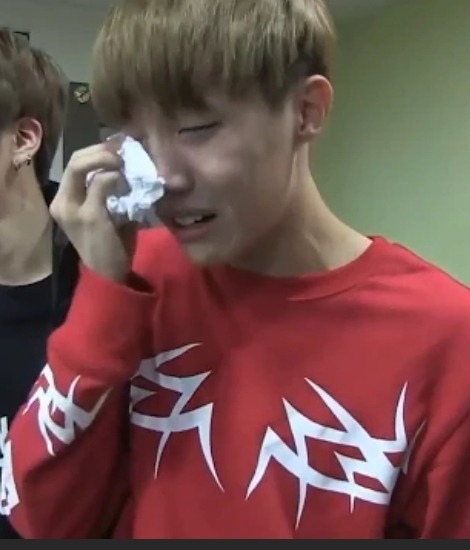
I've been reading it over and over for the past two days and each time I feel humbled by it. Thanks so much for sharing this with me.
I think the era of the obsessed 'kids' and '13 year old shippers' in this space is coming to an end. I think it's time for a more nuanced mature conversation on what it means to ship and stan our faves in today's sociopolitical climate.
Let's intellectualize shipping and use it as a vehicle for social change not just pleasure. Sabotaging political hashtags is a start. Trending and donating to BLM is equally important. Fighting for gay rights and recognition is the next step and a natural progression from here- and about damn time!
Gone are the days where celebrities and idols were immune to accountability and personal responsibility. We live in a world where everyone is required to be converstant in and sensitive to social issues. Awareness is woven into our collective consciousness and for some of us we cannot divorce that from our pleasure receptors.
Hate to quote my pastor but, 'As a kid, I spoke, thought and reasoned like a kid. As I grew up, chilee darling, I put my ghetto ways aside. You feel me?' Lol. Yea, my pastor hood like that. Lol.
The fact of the matter is, BTS has a higher mature demographics now. Majority of us grew with them, if not past them. They are not seventeen anymore, Jin is almost thirty, the youngest in the group is past twenty three and majority of their fanbase are breaching Young Adult well into Adulthood and beyond.
We simply cannot view them with the same lens anymore. If we did, we would be infantilizing them if not enabling them.
We ought to be able to have certain conversations that reflect our age, hearts, backgrounds, experience, values and beliefs.
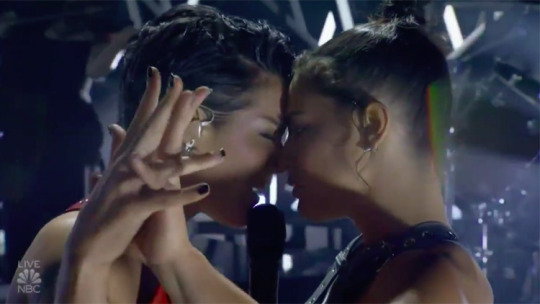
We can't sit behind our television sets and smart phone screens in this day and age and assume BTS sat through a performance like this and did not for a second think about what it meant, why the crowd cheered at certain moments or even understand the impact, message and intent behind it- especially not when Halsey, an openly bisexual woman and advocate for LGBTG rights is an acquaintance of thiers.
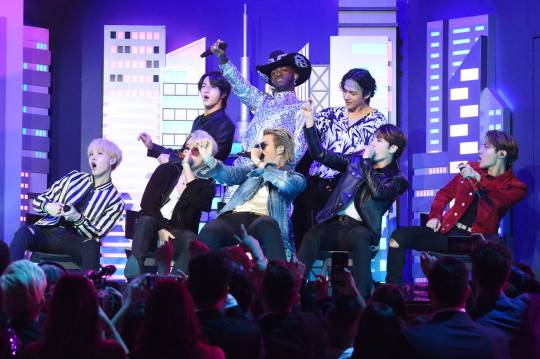
I don't know how a fraction of this fandom can assume BTS would have a collaboration of this nature and not know anything about the gay rights discourse or what queer baiting is or not consider how their actions may or may not be contributing to the marginalization of persons as these- to not have agency and personal responsibility or empathy.

JK cannot stan a gay artist such as Troye Sivan and divorce his music from his sexuality because it flows from it. Not when Troye has openly spoken about the struggles he went through as a closeted gay man, coming out and how that affected his mental health.
JK knows what gay is, he is aware of the struggles queer people face on a daily. His decision to cover, license and recommend songs by this artist is a deliberate act coming from a place of being informed on the matter.
Jimin knows. RM knows. Suga knows.
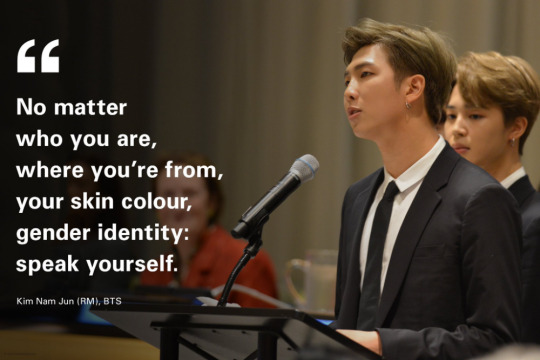
BTS cannot prepare a speech like this while oblivious to the plight of the LGBTQ plus community. I refuse to believe that simply because it's not true. Anyone who says otherwise is a scammer. Lol.
And I think they are intelligent enough to have cognisance of the fact majority of the world view certain aspects of their home culture as problematic and non-progressive and that this same world is watching them and what they do in this space matters.
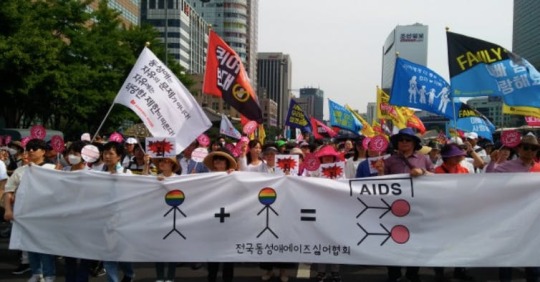
They are part of the conversation. And it's in their interest to present themselves as queer a queer friendly band and company by distinctifying themselves from these 'traditional' Kpop bands.
I believe they know that being woke gives them a competitive advantage as MCs and advocates for the youth in today's world.
I believe they are aware certain things in their 'fan service culture' doesn't fly in the space they compete in and want to compete in. They are competing and rubbing shoulders with top LGBTQ plus advocates, sharing seats with them at awards, standing next to them- they best to look sharp.
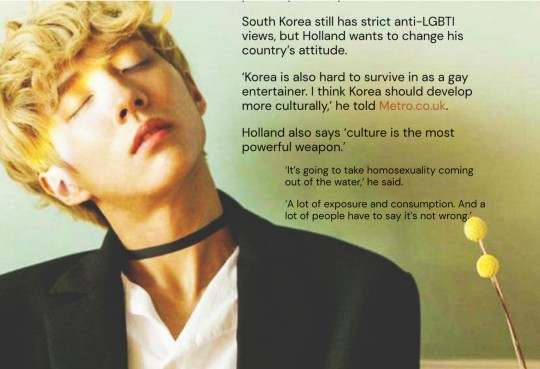
It's obtuse for anyone to fall on the 'culture' rhetoric to excuse certain behaviors of their idols when actual queer people from and within that same culture fight against it.
Most S. koreans I know and have come across complain about their 'culture' and some even harbor strong resentments against this whole fanservice culture.
Holland, an openly gay Idol from South Korea, has equally spoken out against the 'fan service' culture prevalent within Kpop on several occasions and laments how it depoliticizes queerness and affects actual queer people within S.K.
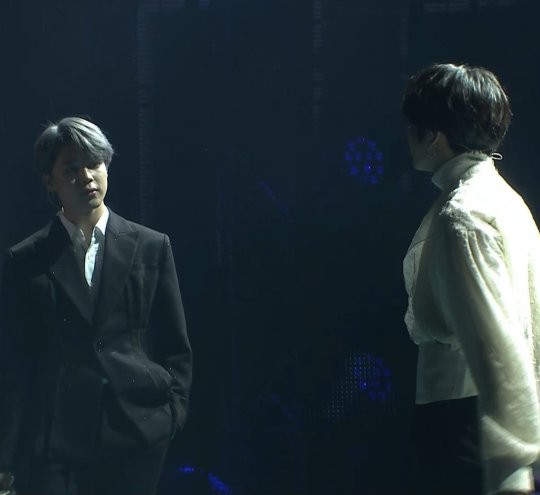
And isn't it funny that the same conservative Christian population who strongly oppose homosexuality in S.K often lead online campaigns against Jikook for 'promoting homosexuality' because of certain fanservice and skinship they do?
If skinship is normal and fanservice is culture, why does conservative S.K keep pushing back against it? It's their culture uno?! Lmho.
Queer south Koreans and conservative Christians hate fanservice culture and yet here we are using their culture to defend it as if it's all black and white. Lmho.
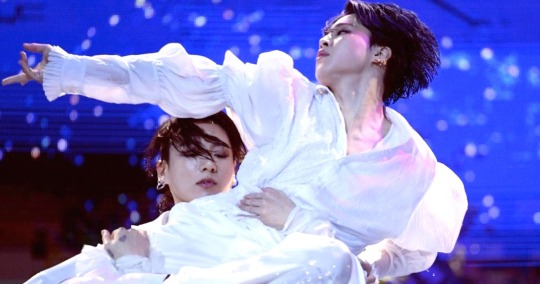
Did they or did they not see South Korean's reactions to this performance by Jikook? The mixed feelings most had about it?
Men can nibble on men's ear but God forbid they toss them in the air and catch em💀
South Koreans are not a monolith. Their culture is nuanced like any culture. It's not static and not clear cut black and white either.
It's one thing to respect other's culture, it's another to perpetuate it in ignorance. Perpetuating their culture and being religious about it does not allow for the dynamism inherent in their culture.
Troye Sivan talked about how he'd stop in the middle of his concerts and performances upon seeing the hyper fangirls in the front row and then think to himself, 'I know they know I'm gay, so why are they still here...'
And this was before he came out.
Jikook know we know they are queer or that we think of them as queer. When Jimin talks about 'those that love me for me' he knows exactly what he is talking about or rather who he is talking to- it's not these hets I'm afraid.
Troye also talked about being privileged because he lived in a rather queer friendly neighborhood where everyone is gay and so he'd always felt safe coming out.
Isn't that what JK is doing?
Now this is a person who's without a doubt had a lot of influence on JK in his early formative years as an Idol right down to his decision to move into a much queer friendly neighborhood of Itaewon.
They know we know. Jikook is gay.
Thankfully, there are reports of a rising number of LGBTQ plus in South Korea, a lot of allies, a lot of queer folks coming out and a lot of companies opening up to working with gay idols and aspiring idols.
It's such a relief but a lot of work still needs to be done and I stand with them on behalf of Jikook and any queer folk in SK.
My sister is helping me reach out to an LGBTQ plus advocate from Seoul for an interview for my blog. If everything goes well, I'd love for her to share her thoughts on queer passing, queer baiting and fan service within Kpop and how that affects LGBTQ youth in South K.
It's a conversation I'm really passionate about and interested in.
I love me some ships, but I also love me some queer advocacy and human rights uno? Lol.
Thing is, I may quit BTS one day, but I can never quit being me. Being human. Always put the human first is my motto.
Oh and I hear people are plotting to cancel me? Chilee. Y'all do that but:
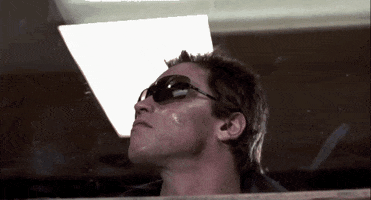
Let it echo.
Signed,
GOLDY
102 notes
·
View notes
Note
i realize this will probably bring up old drama so you might not want to answer it. but do you ever regret, however on purpose or on accident, bringing all that unnecesary hate towards Katara? i'm really sad and dissapointed tbh. i'm a woman of color and katara was so important to me growing up. my favorite animated woman ever. and then this resurgence comes and theres so, so much unnecesary hatred for her and everyone ignoring everything that makes her a good character.
(2/3) 2- and you know, i expected this from the male side of the fandom. they were misogynistic to her and the others even back then so i would expect it to be even worse with how internet culture is more mysogistic now that ever. and i wasnt wrong. male atla fans had some truly horrible takes and views that just came across as racism and misogyny. but, i expected these circles to be better. to be a safe space for us woc who love this character. but i found the same weird hatred for her.
(3/3) 3-i just, i cant believe i feel less welcome now that i did even back then. and back then i didnt even paricipate really. but at least i could enjoy fandom content without stumbling into misogyny and racism every other post. also sorry for sending this to your personal blog b i just wanted to let you know you controbuted to that too even if it wasnt your intention. at least you realized that and arent contributing to it anymore right? cause honestly the hate has only gotten worse not less.
hey anon. thanks for asking this question, because i hadn’t addressed this topic previously and this gave me an opportunity to do so.
no, i don’t regret publicly interpreting a character whom i love through a nuanced and human lens. and i don’t regret combating the one-dimensional interpretation of this character, which posits that she’s merely an vaguely defined object of attraction for some boy or another, and a singularly gentle, mature, maternal figure whose sole purpose in life is to nurture others. those interpretations suck. they rob her of the humanity and complexity that make her character unique and they stem from misogynistic tropes that reduce women to the services they can provide to men. the thing in the world that matters most to me is fighting misogyny, and this trend to diminish a proud and powerful and angry teenage girl by exaggerating only her most socially acceptable traits is misogyny.
unlike you, i did not grow up watching avatar: the last airbender. the shows i watched growing up did not have a lot of girls who felt real to me. the girls i saw on tv growing up were simple. they were the main characters’ crushes. they were simple, desirable, usually sweet and loving, and not much else. if they had a flaw, it was that they were, at best, “awkward.” whatever that means. or if they were the protagonists, which was rare, they were nice enough and tried to do the right thing, but they never had strong feelings like resentment and anger. they weren’t allowed to be unfeminine which meant they weren’t allowed to be bitter, angry or in any way flawed. they didn’t look like the version of girlhood i knew to be true for me personally, which included a lot of anger and frustration and powerlessness.
that crappy representation left me with internalized misogyny that chased me for longer than i’d like to admit. i did not learn to think of girls as humans who could be as interesting and flawed and messy as the boys were. i did not value myself as a girl, and later a woman, because i thought the best thing a girl could be was... bland. boring. pretty, but empty. passionless.
it would have meant the world to me to see a character like katara.
because katara is angry. she has every right to be: she’s had so much stolen from her, including her mother, her people, and her childhood. katara has a short fuse. she yells. she snaps. she fucks up. sometimes she makes mean jokes! i never saw a single one of those dreamily perfect cartoon love interests make mean jokes when i was a kid. she is extremely idealistic--it’s her defining character trait--but we see the bad side of that as well as the good. we see that her need to help others leads her to act rashly, to get herself into danger, to put others in danger too.
and she has her very own arc. it’s not about her love for another person, either (what a snooze of a storyline); it’s about growing up and learning to break down some of that stubborn black-and-white thinking that we all indulge in as children. it’s a true coming-of-age arc and it belongs to a fourteen-year-old girl.
when i, to use a phrase i find crass, “entered the fandom,” i quickly realized that other fans’ perceptions of katara did not line up with the things i valued most about her. other fans seemed to valorize her most socially acceptable feminine qualities: her generosity, her kindness, her dedication to helping others. and of course i love those parts of her--i love everything about her--but what is really remarkable about avatar: the last airbender is that katara’s many important virtues are also counterbalanced by equally significant flaws. a good character has flaws. katara is a good character, and a deviation from the characters who made up my formative media landscape, because she has flaws. her temper, her idealism, her stubbornness--these are flaws. flaws make her seem real and human and challenge the mainstream sentiment that girls are not real or human.
it simply did not occur to me that celebrating these aspects of katara that make her a realistic and well-written teenage girl would spark ire from other adult fans. it absolutely did not occur to me that i would then be blamed for somehow causing misogynistic interpretations of this character, particularly given that misogynistic interpretations of this character are the very thing i sought to correct when i began to blog about this television show.
i’m told there are “fans” on instagram and tiktok who think katara is whiny, annoying, and overly preoccupied with her trauma. i do not use instagram or tiktok, so i wouldn’t know, but i’ll take your word for it. respectfully, however, they didn’t get that from me. misogynistic takes on katara have existed since before i came along. i have never, ever called katara whiny. and seeing as i have been treating my own PTSD in therapy for nine years, you can safely conclude that i don’t think anyone, katara included, is overly preoccupied with their trauma. that’s not a thing. do i think she’s annoying? of course not! as a character, she’s a delight. does she sometimes find real joy in aggravating her brother and her friends? yes, because she’s 14. i, an adult, am not annoyed by her. sokka and toph often are, because that is katara’s goal and katara always succeeds in her goals. she’s not “annoying.”
if there are “fans” who are indeed following lesbians4sokka and somehow misreading every single post and interpreting them to mean that we hate katara and they should too, i don’t really know what you want me to do about that. l4s has over ten thousand followers and we have already posted so many essays disavowing katara hate. our feminist and antiracist objectives in running the blog are literally pinned with the headline “please read.”
furthermore, you cannot reasonably expect my co-blogger and me to control the way our words will be received. we should not have to, and are not going to, add a disclaimer to every post saying that when we critique or make jokes about a teenage girl we are doing so through a feminist lens. our url is lesbians4sokka, and we are clearly women. if that alone doesn’t make it obvious, then refer back to that pinned post.
it is indescribably frustrating, and really goddamn depressing as well, that people are so comfortable with the misogynistic binary of Perfect Good Women and Flawed Wicked Bitches that they perceive any discussion of a woman’s flaws to be necessarily relegating her to the latter camp. if that is how you (a generic you) perceive women, then i’m sorry, but you’ve internalized sexism that i cannot cure you of. and it’s unjust to expect my friend and me to write for the lowest common denominator of readers who have not yet had their own feminist awakenings. we do not write picture books for babies. we write for ourselves, and with the expectation that our readers can think critically. reading media through a feminist lens is my primary interest; i have no intention of excising that angle from my writing.
as i go through my life, i am going to embrace the flaws of girls and women because not enough people do. as long as the dominant narratives surrounding women are “good and perfect” and “unlovable wh*re,” you’ll find me highlighting flawed, realistic, righteously angry women in the margins. and for what it’s worth, it’s not just katara. i champion depictions of angry girls in all sorts of media. that’s sort of my whole thing. my favorite movies are part of the angry girl cinematic universe: thoroughbreds, jennifer’s body, hard candy, jojo rabbit, et cetera. on tv, in addition to katara, you’ll find me celebrating tuca and bertie, poppy from mythic quest, tulip and lake from infinity train, korra, and more. i adore all these women and see myself in them. i hope you find this suitably persuasive to establish that i have sufficient Feminist Cred, according to your standards, to observe and write about these very flawed and human fictional women.
what i’m saying is this: i decline to take responsibility for the misogynistic discourse orbiting a children’s cartoon. as someone who writes about that series from a perspective that seeks to add humanity and nuance to the reductive, one-dimensional, overwhelmingly sexist writing that already exists, i am pretty taken aback that i am the one being blamed for the very problem i sought to address. except not that taken aback because i am a woman online, haha! and this is always how it goes for us.
finally, i think it sucks that you’ve chosen to blame me for a problem that begins and ends with the patriarchy. i can’t control the way this response will be perceived, just like how i can’t control the way anything will be perceived because i am just one human woman, but i do hope you choose to be reflective, and consider why you’ve chosen this avenue to assign blame.
#anyway! this answer is too long and it's undignified to answer ''fandom drama'' queries on le blog#but here we are in 2020
233 notes
·
View notes
Text
“The 02 characters didn’t get any character development”
Yes, they did.
“But -- “
Yes, they did.
Having had the gift of having rewatched 02 recently, I have to say that it still really, really confuses me how the hell people get this impression. It’s not even “I’m trying to see the best out of this” but that I genuinely do not get it, because as far as I’m able to see it’s pretty much literally right there!! This isn’t even tinfoil hat tier!
But in case you have any doubts, sit down because Shiha’s gonna sit here and write a meta about the 02 kids, and how they are perfectly reasonable characters that developed properly fine over the course of the series.
(All below translations of 02 dialogue are by PositronCannon.)
So the first thing to understand about 02 is that it is fundamentally made with a very different writing approach from Adventure in the first place, and therefore it is not meant to be compared in a one-to-one fashion.
This is a point I’ve said many times over and over, and I think it’s to the point where it shouldn’t even really need official clarification, but I’m just going to go ahead and bring up the words from Director Kakudou himself:
For instance, we had the prior series stick out in terms of its points about “what it means to be oneself”, and for 02 we made it so that you would pay attention to “the relationship between yourself and other people”.
Right, so: 02, by design, does not use Adventure’s character development methodology of “self-awareness”. It is built from the ground up by having its characters and character development predicated on relationships instead of singular characters. This might seem a bit odd on its face, but no man is an island, and, in fact, changing the way you interact with other people and with the world in general does speak a lot about one’s personal growth in its own way. And this also means that if you try to analyze 02 by holding it to Adventure-based standards of “character focus episodes” or the like, you’re already on a losing battle.
This means that character growth in 02 is not presented in a way where it’s up-front and center, but rather something you have to glean over the natural course of the series. We’re working off relationships, so you have to actually pay attention to the natural interactions between the characters or what they say even during “off-hours” -- the focus-episode format used by Adventure doesn’t apply here anymore. And it’s something apparent enough from how “evolution” is a metaphor for “personal growth” in this franchise -- in Adventure it was via the Crests, which meant self-awareness, but 02′s key evolutionary trump card is Jogress, which relies on the strength of relationships.
One thing I have to say in terms of my experience as a 02 fan is that I’ve found I actually appreciated it significantly more as an adult than I did as a kid, and that, in general, a lot of the things to appreciate about 02 are things that you really viscerally feel and understand when you’ve gotten that degree of life experience under your belt. Unfortunately, this is kind of a double-edged sword, too, because it ends up becoming the kind of series that often risks going over the heads of the very audience of children it was supposed to be targeting. It’s got a lot of very nuanced depictions of mental health and the childhood experience that are maddeningly subtle, to the point of possibly going over one’s head or even coming off as illogical without sufficient life experience, or simply just not being as visceral (the entire theme of “parents stroking their own ego with their kids’ achievements” hits the hardest when you’re college age).
So what this means is that 02 doesn’t exactly hand its themes or character development to you on a plate. But it is there, once you actually start looking for it.
Let’s start off by talking about our main core cast of characters. Adventure and 02 prided themselves on the fact that they tried very hard to not be adherent to anime tropes, but rather to portray well-rounded, nuanced characters that felt more like actual kids you might meet at school. So how does the 02 cast fare in not being pigeonholed anime tropes?
Daisuke: Even though official freely admits he has “the most anime-like personality”, it’s hard to say he actually falls that much into the generic shounen archetype. For one, he’s actually shockingly humble and polite in certain situations (he’s consistently polite with his elders, and is very quick to admit his own limitations). Actually, he comes off as a surprisingly friendly and deferential person -- it’s just that he happens to have somewhat of an abrasive exterior, and even then it’s implied heavily in the first half that this stems from a lack of validation and purpose. (He actually “deflates” really easily, so you can’t even say he’s all that arrogant past the surface.) Certainly he’s simple-minded, and kind of an idiot, but his abrasive exterior is actually pretty deceptive.
Miyako: Miyako floats an interesting duality of simultaneously being aggressively feminine and being aggressively un-feminine -- not necessarily in the sense she tries not to be feminine (on the contrary, she absolutely embraces it), but more that she’s also an aggressive, “inelegant” mess in ways atypical for a lead heroine in a shounen show, who are usually either cute or “badass action girls” and not...a mess. Despite that, she is also consistently portrayed as capable of heavy emotional depth and being very genuinely kind and concerned about others, which are not in any way diminished by the fact she happens to be an aggressive mess with a severe case of foot-in-mouth syndrome. It’s an interesting mix of character traits that you don’t see often.
Iori: “Designated young characters” usually fall into the “cute” archetype a la Adventure!Takeru or Tomoki, so it’s interesting that the youngest one is actually the most mature one, and impeccably polite at that (having been raised by a family that emphasizes formal manners and propriety). Even more interestingly, nobody actually treats him like he’s that much younger, and he’s given the weight of respect in a sense that has nothing to do with his age (think about how there are indeed quite a few kids who simply just get along better with older kids). Yet the series doesn’t shy away from his youth, and his overly black-and-white view of morality is portrayed as immaturity in its own way, along with the occasional “slips” in his facade or manners indicating that it’s still something he has to consciously focus on.
Ken: Ken’s development goes without saying (it’s one of the most consistently praised aspects of 02), but it’s also interesting to note the unusual way the series plays his redemption arc. Instead of making him a typical “jerkass anti-hero who learns to get a bit better”, the series completely blindsides you by revealing that Ken is, in fact, a naturally soft-hearted and kind boy, and then plays up the mystery of the severe kinds of trauma that would lead him down that path. And ultimately, even though the cause is revealed to have supernatural influence, the series also makes it clear that it doesn’t matter -- that, whether it was his conscious “fault” or not, he still is responsible for what he did. And on top of that, it also scorns the usual “redemption by sacrifice” mentality by pointing out that it’s a cop-out -- it doesn’t actually solve the problems that were caused, and, in fact, a much better way to make up for things is to fix them going forward.
Takeru: Takeru had the “designated young character” role in Adventure, and it turns out that once one of those gets a few years older, they’re naturally not going to be nearly as pure and innocent! The “sweet child” from Adventure has now grown into having slightly pettier emotions, even to the point of grudge, and things he won’t let go of. Oh, and also, trauma from three years prior is still going to have impact on an eleven-year-old kid. Who would have thought.
Hikari: Adventure’s most infamously inscrutable character also seems to have gained some individualized, not-quite-innocent traits of her own (observe how she deals with Daisuke’s advances), and, moreover, it turns out that her deferential humility and refusal to open up about her problems is...not a good thing! when it starts to actually bite her in the rear in front of her friends. Yeah, it turns out that being the “quiet cute girl” actually has its own mental health drawbacks. Oops.
We’re doing pretty well, actually! At the very least, they certainly feel like they already have the Adventure/02 brand of character nuance, where their personalities are inherently varied and nuanced enough that you may not quite find characters like them elsewhere. On top of that, we definitely get to see what makes these characters “tick” -- we get a lot of depth into their thought processes and what their likes and dislikes or strengths and weaknesses are, and that’s something 02 still completely beats out a lot of other kids’ shows or even certain other Digimon entries with.
But here we’re talking about character development. So what do we know about them at the very beginning of the series?
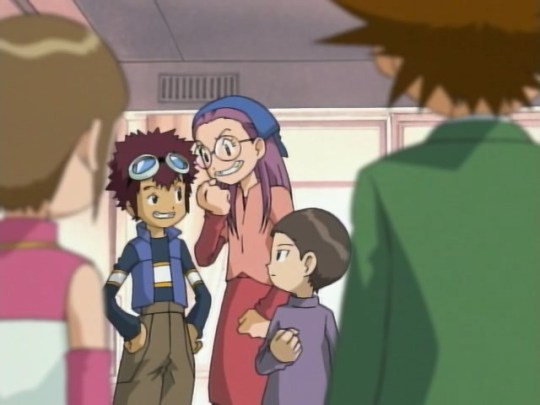
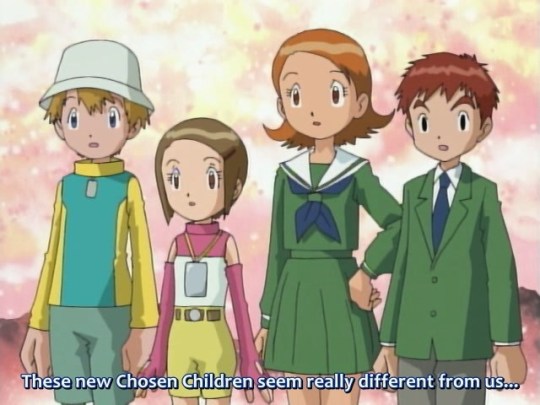
Having watched 02 in Japanese a few times and being very used to the core cast’s latter-half characterizations, rewatching the early episodes always strikes me really hard in the face with genuine shock at how shallow the kids -- especially Daisuke and Miyako -- start the series off as. It’s understandable in terms of the context of the series -- unlike the Adventure kids, who were thrown into a “survival, need to get home” situation off the bat and thus already understood the need to be wary, these kids started off having comparatively easy access to home at any time, and didn’t have a constant sense of danger and survival looming over their heads. It naturally took a lot of time for the gravity of the situation they were in to start really hitting them, and so even the relatively straight-laced Iori didn’t exactly take it all that seriously at the beginning.
Yet while it took them a significantly more delayed time to understand what they were dealing with and take it as seriously as they needed to...they started cultivating something else in the meantime.
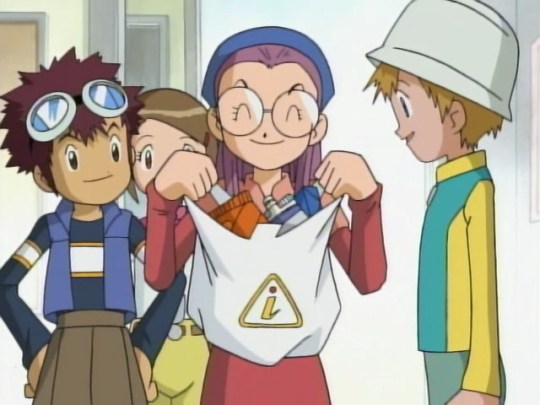
02′s first half is especially full of “random banter conversations” that seemingly involve nothing in particular, but, in fact, that’s actually part of the point. One thing I have always been quick to point out in regards to 02 is that it is rather unique among Digimon series in how it goes out of its way to portray its core cast as having become friends even in pure daily-life social friend terms, even if it had absolutely nothing to do with Digimon incidents -- these are kids who genuinely enjoy each other’s company even in the most mundane of situations. This was something that wasn’t the case for the original Adventure kids -- having been a group of kids thrown together by necessity, even though they most certainly kept in touch and trusted each other as fellow Chosen Children deeply, they started floating back into their own different social clusters after the events of 1999. Relationships are multifaceted, after all; you can still have a deep relationship and bond without necessarily being friends on a social level.
But already, off the bat, Miyako brings food for her new best friends, and it’s implied that she’s the main ringleader behind holding the picnic -- a picnic that started off having no intended relation to the Digital World territory war -- in episode 6. And, to be quite honest, can you really blame these kids? Even the Adventure kids wistfully entertained the idea of a long-term fun adventure through the Digital World in Adventure episode 54, wanting to enjoy its beauty and fun in a situation where they weren’t constantly running for their lives. Now that this luxury is actually available, why not take advantage of it -- and bond further with the others in the process? And for the rest of the year, these kids actively end up spending mundane conversations together and bonding to the point that, by the time we get to the end of 02, these kids have just genuinely bonded so much that they really come off as a cohesive, inseparable unit that would actively choose to spend time with each other if given the opportunity. In fact, even going through all of the TV Digimon series that exist as of this writing, I would say Appmon is the only one that really competes with 02 in portraying its core cast in this manner.
Again, remember: this is a series where characterization is dependent on how the kids treat others and interact with them, so you do actually have to pay close attention to these interactions and see how they change over the course of the series.
So once the episodes start coming in play, we actually learn a lot more about what happens when the characters start breaking away from their shallowness. For instance, episode 8, one of the first key episodes to understanding Daisuke’s character:
Daisuke: He'll be a great opponent. We didn't face off in the last tournament. Takeru: If you had made it to the finals, you would have, right? Daisuke: Don't remind me... Hikari: Can you win? Daisuke: It's not about winning or losing. Right now, all of the boys who play soccer in this country want to be like him. Just thinking about playing against him makes me excited!
For all Daisuke initially seems to be arrogant, he’s actually not that incapable of humility. Far from it, actually; he does have a genuine love for soccer and the spirit of the game, and, when completely and obviously unmatched, fully admits he has no chance and is set on enjoying the most he can out of it anyway. I feel like Daisuke’s surface-abrasive attitude really does throw off the fact that he’s a lot more genuinely humble than he’s given credit for. In the end, he’s satisfied enough with the accomplishment of pulling off one sliding tackle against Ken, and is able to enjoy that -- a foreshadowing of how the latter half relies so much on the fact that he’s capable of enjoying simple pleasures and being straightforward about them.

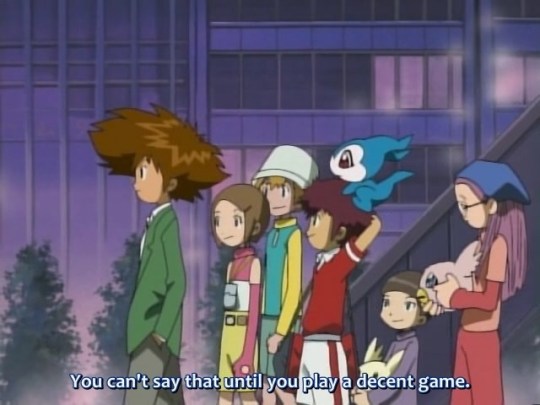
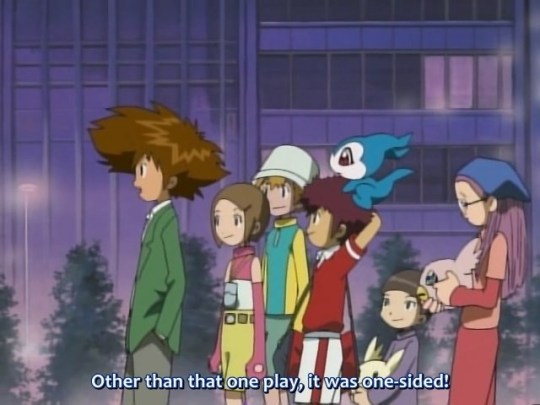
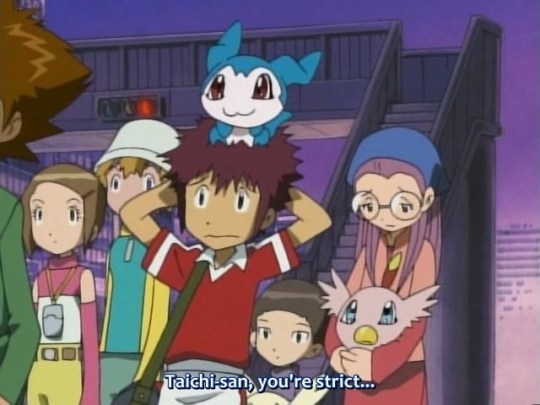
I find that this scene is really underappreciated, too (mainly because it gets lost in all of the other major things in this episode) -- while Daisuke jokes about his accomplishment, it only takes a single comment from his respected senior Taichi to shut him down.
There’s a huge reason I constantly emphasize that Daisuke respects his elders -- this part tends to get lost in translation a lot (especially the American English dub, which just smashed this aspect out of him wholesale, among other things) due to it being a bit reliant on Asian senior deference and cultural propriety, but Daisuke is respectful not only out of societal obligation but also because he genuinely respects his elders! The way he looks up to Taichi and chases after his approval is genuine, and even his interactions with the other Adventure kids have a major hint of him having genuine respect and deference to them. Daisuke is just a deferential person in general -- note that while his crush on Hikari tends to manifest when he’s at his most shallow, he’s actually the one putting Hikari on a pedestal (considering it his own responsibility to impress her), so he’s not actually as assertive as he tries to come off as. The first half of 02 arguably has him deflating more often than he actually stands his ground...and this is a trait of him that starts to actually change quite a bit over the course of the series.
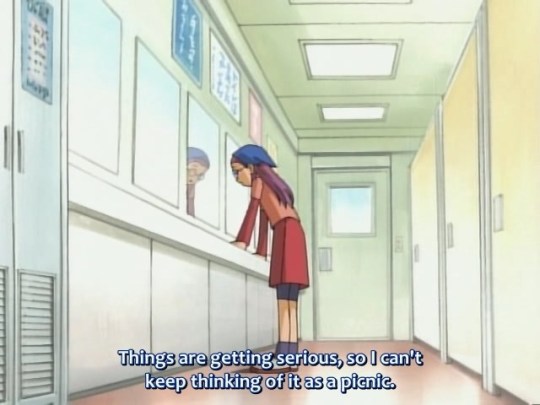
Miyako comes to terms with the fact that maybe she’d been taking this whole Digital World adventure thing too lightly in episode 10, indicating that she actually does have a good sense of priorities when they become increasingly clear! This is actually very important, because it fleshes her out as someone who’s emotionally sensitive -- too emotionally sensitive, to the point that “emotional sensitivity” is just as much of a driving point behind her later breakdown in episode 18, this time from taking her duties too seriously. Miyako is a very id-driven person, and so a lot of the early series is her struggling to find a proper balance on how to adjust her emotions in an increasingly escalating situation. Her heart is in the right place, she’s just not someone with an inherent sense of preparedness to deal with this kind of problem.
We get into the secondary Digimental arc, and there’s a noticeable consistent thread that all of them involve admission of personal faults. This is something that tends to throw people off at times -- wait, having bad traits about yourself is what awards you? -- but the point is that this isn’t like Adventure’s Crests, where things came from proof of exercising the virtue, but rather admitting that there are ways you need to improve, and showing a will to improve in that manner. In the end, people are not perfect human beings, and sometimes even understanding that you’re deficient is half the battle -- after all, the second half is all about a certain character named Ichijouji Ken coming to terms with some very, very serious personal problems.
In episode 11, Daisuke completely admits that he doesn’t feel he understands the concept of friendship the way Taichi and Yamato et al. see it, also latently admitting that he doesn’t see himself as worthy of the Digimental of Friendship. Beyond betraying a lot deeper issues within Daisuke that he seems to have actually had a background lacking in friends and sources of validation, he actually acts very self-effacing when admitting his issues to Taichi and Yamato, ultimately culminating in him calling himself pathetic. Or, in other words, he does want to be a better friend and to understand the concept better, and is harsh on himself for not doing better (which, of course, ultimately leads to how he eventually does gain better relations with the rest of the group and reaches out to Ken).
In episode 14, Miyako admits that she’s shallow and judgmental and tends to jump to conclusions based on first impressions. Recall that she’s comparing herself to Mimi in said relevant scene -- Mimi, whom she admires, and actually spends part of the episode trying to understand and empathize with the mentality of. This is not a statement of Miyako being proud of herself. Rather, this is Miyako being very straightforward about the fact that she needs to try harder to see through the essence of things and to see through to the emotional core of. Again, something she actually does start developing over the course of the series.
In episode 16, Iori gets his first major lesson on the limitations of being too stuck on principles in his attempt to be honest. Recall that Iori’s later character arc is very dependent on him realizing that his own view of the world is too black-and-white. It’s great if you could never tell a lie to anyone, ever, but in the end, that’s going to reach limitations of practicality -- after all, as Jou points out, what Iori did ended up not actually hurting Jou in comparison to the incredible amount of hurt it would have caused everyone by being too stubborn, and thus Iori would have failed to keep his responsibility to help the others because of one narrow-minded principle.
Hikari even gets in a bit during the infamous episode 13, where we learn that her “passive” attitude is biting her in the rear. In Adventure, Hikari’s passiveness and reticence had mostly been used as satellite development for Taichi (his insecurities as an older brother and his obligations to her), so this is actually the first time we get to see a proper perspective from Hikari’s side, and it turns out that his overprotectiveness has actually caused her to get dependent. But even though Taichi is the one the episode actually focuses on, the larger focus is more specifically on the fact that Hikari is too passive -- that she sees being taken by the Dark Ocean as an inevitable thing that’s just going to happen unless someone else steps in on her behalf. Takeru, of course, is having none of it.
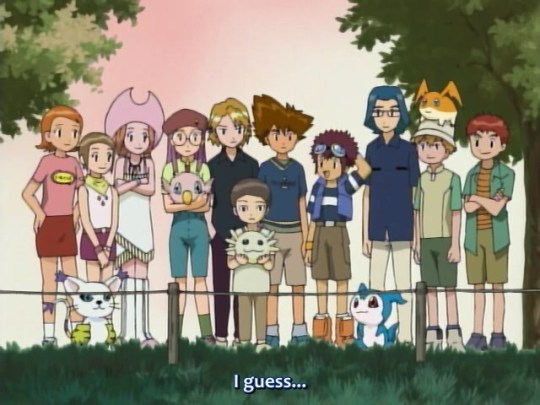
Once that’s out of the way, we go back to taking a look at the subtleties of everyone’s interactions. While everyone generally tends to focus on the second half of episode 17, it’s also pretty interesting to see how the 02 kids react to hearing about their seniors’ adventure in the first half -- remember that this is the first time the 02 kids are actually given any real depth about the degree of 1999′s events that’s not just random points of hearsay, and the way the new kids react to it indicates that they’re thoroughly floored. It’s later established that they didn’t even get the full story (it may not even be possible, given that the Adventure kids’ experiences may well have gone even further beyond what we got to see in 54 episodes), and yet the new kids are overwhelmed. 02 itself does not shy away from the fact that the younger kids really have no qualms about deferring to their seniors if need be, and treating them with utmost respect.
Another minor note, which I pointed out in my Daisuke meta earlier, is that the beginning of this episode is pretty much the last time Daisuke ever shows outright hostility towards Takeru for his relationship with Hikari -- it’s something you have to glean by squinting, but the implication is that the insecure and clingy Daisuke actually got to learn this episode that the two of them had a pre-established shared experience that he himself may not understand, and that it wasn’t just Takeru randomly swooping in and snatching away the closest thing he had to a friend for no good reason.
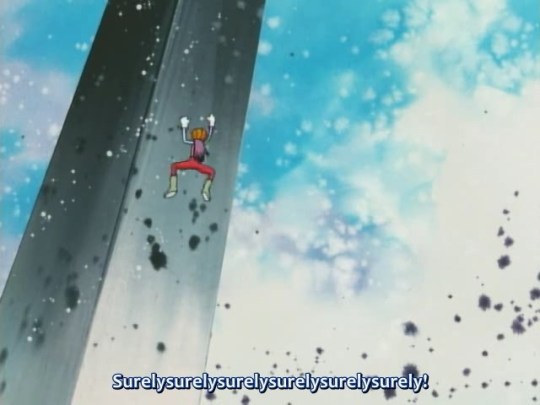
Once the Kaiser infiltration arc begins, episode 18 ends up being one of Miyako’s funniest episodes, but it’s a bit distressing that a lot of people in the fanbase often never let Miyako live this incident down, when in actuality this was explicitly not a good mental health day for her. (This is basically the equivalent of pinning Mimi as a conceited, self-centered jerk based on the fact she was one for a fashion in Adventure episode 25.) The beginning and ending of this episode establish that this is basically a result of Miyako...trying her hardest. She’s scared as hell, but she also learned in episode 10 that this is something she needs to take seriously, and the stress puts her into a mental breakdown. This is why she ends up having a heart-to-heart with Hawkmon at the end; her heart is in the right place, but she needs to find a way to channel her emotional sensitivity in a way that doesn’t make her into a complete mess.
And note that her own voice actress, Natsuki Rio, even pointed out that Hawkmon’s actions had enough of an influence on Miyako’s character that she had to play her differently thereafter.
At first I always played her with Maximum Excitement, and I kept thinking “someone, please, stop her,” but the more straight-laced Hawkmon did his best to pull her in and hold her by the reins (laughs). Thanks to him, Miyako became a lot more of a put-together person…thank goodness Hawkmon is her partner!
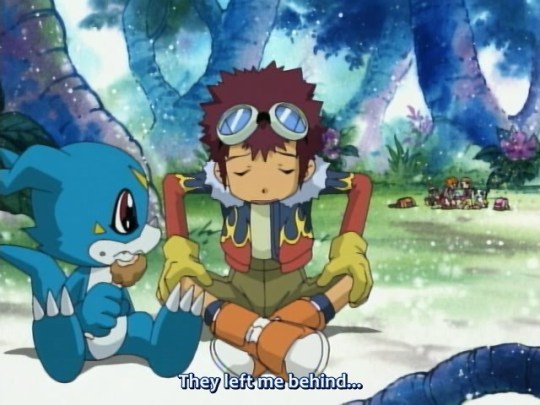
Episode 19 has two interesting things of note that I want to point out -- first of all, starting from the very beginning of the episode, everyone ditches Daisuke because they’re independently going in to infiltrate the Kaiser’s base. Note the complete lack of a plan here whatsoever -- everyone’s just going in on their own -- and the fact that everyone expects Daisuke to come up with what he wants to do on his own. For all it’s worth, even though Daisuke may have a designated protagonist aura to him, within the story itself...nobody actually sees him as a leader at this point in the series (and, to be fair, he’s never really tried to claim the position, either).
It’s similar to how Taichi was never recognized as a particular leader of the Adventure group until Adventure episode 28, but in regards to the full team dynamic, it’s actually inverse -- the Adventure kids were capable of making tactical plans together as early as episode 20, but fell apart emotionally in short order as soon as Taichi was gone, whereas here, the kids are fond enough of each other to hang out socially and support each other emotionally, but they take a while to get any real cohesiveness as a fighting group.
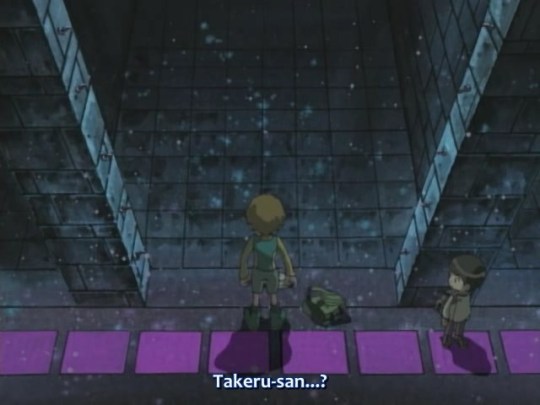
The other is that Iori personally witnesses Takeru’s sudden whiplash into his grudge against the darkness and the Kaiser, and it scares the hell out of him.
Takeru eventually laying a punch on the Kaiser is a pretty awesome moment (and, really, Ken kind of deserved it, so it’s hard to not cheer for him), but it’s also important to note that within the context of the series, this is not a good mental place for Takeru to be in. Iori, the person who should by all means sympathize with hatred of evil things at this point of the series, is still extremely unnerved by Takeru’s actions here, because he’d always seen Takeru as a mature person who’d always kept his composure, only to show a drastically different side of him that he hadn’t even shown a hint of before. That kind of “two-facedness” and emotional repression -- and this way of venting trauma in general -- cannot be good for Takeru at this point in time, and it’s also an important moment for Iori when he later admits during the two’s Jogress arc that he’s having a bit of a hard time understanding him.
And so episode 20 comes, and Chimeramon pretty much takes out the entire party, leading to this conversation.
Takeru: Let's escape. Daisuke: Escape? Takeru: We can't fight anymore. Our mission has failed. We'll retreat and wait for another chance. Hikari: You're right. We have no other choice. Iori: Understood. Daisuke: No. Miyako: Daisuke? Daisuke: We can't just say "another chance" like that. If we leave now, they'll keep attacking anything in sight. We don't know if we'll be able to get into the fortress again. So this is our only chance! Hikari: That's crazy... Iori: Exactly! Miyako: They're all back to their Baby forms... Chibimon: Daisuke... Daisuke: But...didn't you all see it? Destroying those towns...and all we could do was watch quietly. I don't want to see that ever again. I won't let them do whatever they want! So I'm going, even alone. I won't give up now. After getting this far, all I can do is go forward!
Why is this moment important? This is the first time Daisuke has actually stood a firm ground against anyone else in the party -- and not only that, with the entire party standing against him.
Recall that I mentioned earlier that, in spite of Daisuke’s abrasive attitude suggesting otherwise, he actually has a tendency to “deflate” pretty quickly when people tease or criticize him. He spends the first half of the series having a lot more bark than he actually has bite. Earlier in the series, if the entire party were to go against him, he’d be more likely to begrudgingly go along (while complaining) -- in fact, he actually did just that at the beginning of episode 7! But now that push has come to shove, Daisuke’s own sense of morals and bleeding heart have won out. (While his decision here is definitely a bit reckless, he does have a point; if they’d retreated, they might genuinely lose any future chances.) Even with the entire party telling him to pull back, he refuses to accept what they want him to do, and pushes forward.
This is where Daisuke first starts to really make strides towards what becomes his eventual major role in the group as “the one who pulls people forward”. It’s a moment after which the rest of the group themselves also start to treat him with more respect now that he’s proven he’s not just a doormat, and that when it comes to there being a real problem with real priorities, he does have the resolve and initiative to keep going.
Also, a very important point is that he immediately says he’ll go alone if he has to. He doesn’t begrudge the others for wanting to fall back, and has no condescension towards them; he just can’t stand the fact that he himself is being asked to sit it out.
So, you know. Episode 21 happens. Ichijouji Ken goes through some real trauma as Wormmon dies in his arms. And all Daisuke has to say is...
Daisuke: You should go home. There are people who are worried and waiting for you! Go home!
Remember when I pointed out that 02 takes a very unique perspective on Ken’s redemption arc, pointing out the futility of being too trapped in the idea of symbolic penance and focusing more on actively taking steps in the future to make up for and fix things? Here’s our first major sign of this, and Daisuke’s eventual approach to Ken -- Daisuke does not choose to scorn or lambast Ken for what he’s done, even though there are a lot of things Ken deserves to be harped on for, but rather instructs him to take the first active step towards fixing his mistakes, in this case fixing things with his family.
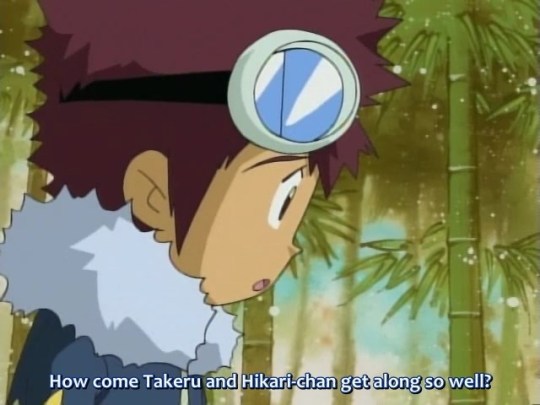
Episode 22 is Daisuke’s own “fanbase will never let him live this down” moment, but there’s still some interesting things to note here. Firstly, Daisuke’s “relapse” happening exactly when it seems like his duty to the Digital World is done and there’s nothing to do besides community service doesn’t seem coincidental, especially when this exact episode actually dedicates a full scene to Takeru, Hikari, and their partners going “...now what?” Secondly, as I touched on earlier, note that Daisuke’s never really seemed to have any resentment against Hikari for not responding to his affections -- in fact, he still considers it his own (and V-mon’s, by extension) duty to be the one to impress her. It’s a surprisingly refreshing take on the “shounen hero with a crush on a girl” trope, because in the end...Daisuke isn’t actually all that possessive of her, he just really wants validation from her, and respects her a lot.
More importantly, though -- note the way Daisuke handles this topic. He’s not actually mad at or resentful of Takeru anymore. In fact, he’s mulling on the topic and wondering what he could do to be on that level. Yup, even when Daisuke’s being shallow and jealous, he’s still learned to handle this issue ever so slightly more maturely than he would have at the beginning of the series.
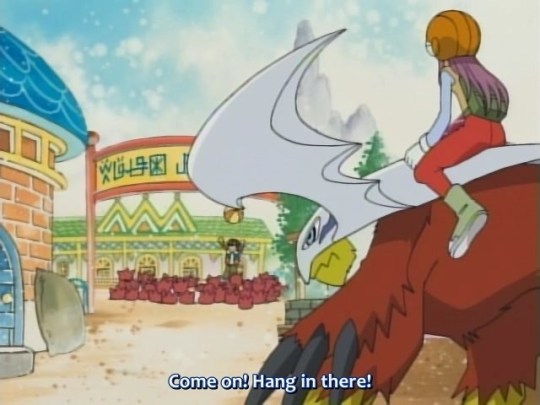
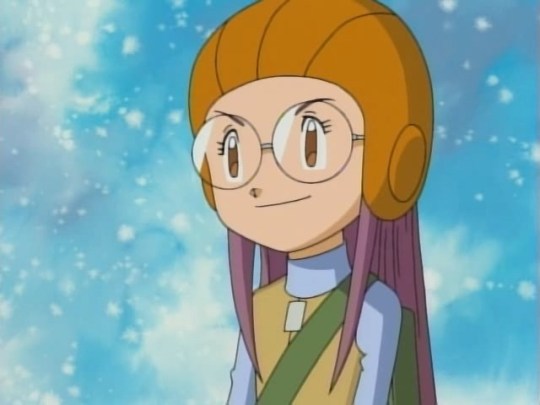
This is also important because only one episode later, once Daisuke becomes disappointed again at Takeru and Hikari walking off on their own, Miyako intervenes -- not only so that Takeru and Hikari can have their space, but also so that Daisuke can have some genuine fun and something to do. This is a very blink-and-you’ll-miss-it moment in episode 24, but it makes it very clear that Miyako was looking out for Daisuke’s welfare, too, and I think it’s very important in light of the events of the prior episode. Miyako, who had always been fumbling on what to do with her emotions, is starting to properly channel them into managing the dynamic between the team and checking in on how everyone’s doing, and that starts to guide her actions and relationships for the rest of the series.
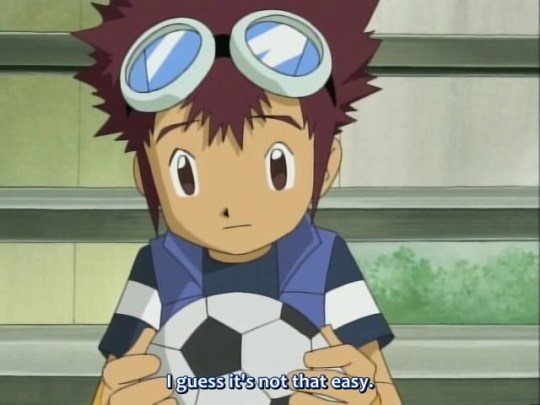
The next episode (25) is where we kick off not only the Jogress arc, but also the arc where we start going into everyone’s attitude towards Ichijouji Ken. This is important not only because Ken happens to be the effective central figure of 02′s story, but also because -- well, remember, 02 is fundamentally founded on the concept of relationships, so it’s only natural that the other kids’ relationship with the “team newcomer” will be a key aspect of the second half, and in relation to their own characters.
Remember how I said that Daisuke’s first-half character involved him being extremely deferential and often deflating whenever he was criticized or someone stood against him? At the time of episode 25, once again, pretty much the entire team is standing against him -- he’s the only one who’s this level of open-minded about getting Ken into the group, and everyone else is showing differing levels of opposition. But while Daisuke doesn’t begrudge the others for thinking this way, he also doesn’t back down, either, and reaches out to Ken on his own because he still really believes in what he’s doing. Now that he’s settled into what it means to be a Chosen Child, he’s started to gain a proper idea of what he wants to do, and what he feels needs to be done.
So, let’s recap everyone’s stances on Ichijouji Ken at the time of this episode!
Daisuke: Forward-thinking and optimistic; willing to believe that Ken should be given the chance to make up for his mistakes and that they should put everything behind him, even to the extent of believing that there’s probably a good reason for the more suspicious aspects about him (prior to the events of episode 25, it was unclear whether Ken was being a bit too callous about killing Digimon). Also the most actively aggressive in reaching out to Ken and trying to get him to join them.
Miyako: Forward-thinking; she openly states at the beginning of the episode that she thinks Ken’s learned his lesson, she’s just worried about whether he’s going to keep doing questionable things in the future (killing Digimon). Once it’s on the table that he’s not just doing this callously, she immediately is on board with him (to the point of even being the first in the group to use given name basis with him), but her stance on what to do with him is more on the edge of “give him space and wait for him to come on his own terms” (she ends the episode saying she’ll be waiting for him to come).
Takeru: States in the episode that he does believe that Ken’s changed, but doesn’t really know what he’s thinking (i.e. too inscrutable to really be sure about). The later episode 35 implies that Takeru was inclined to be a bit more sympathetic than you’d think otherwise, because he understands the trauma of losing a Digimon partner.
Hikari: Wants to wait a little longer and see how things play out. (Remember that Hikari has a known, consistent thread of taking a very passive approach towards things.)
Iori: Absolutely against it on sheer principle.
It should be noted that none of these stances are wrong. Iori sometimes gets a lot of flak for being the one with the most infamously cold stance towards Ken, but when you really think about it, Daisuke and Miyako are very lucky that their hunch about Ken was right and that he actually did happen to be a very kind boy who had a little too much trauma and some supernatural influence. The fact that Ken is a very emotionally withdrawn person for the rest of the series meant that the two of them ended up breaking through to him the most, but there’s nothing wrong with Takeru, Hikari, and Iori’s skepticism; Ken did some pretty shockingly horrible things in front of their eyes for the first half, and it’s entirely within their rights to determine how forgiving they want to be with him.
In any case, we get to episode 26 (the first Jogress), and most of that episode goes without saying, but I do want to emphasize Daisuke’s lines right before it happens.
Daisuke: If you die now, you won't be able to accomplish anything...I don't want that! Ken: I don't want that...There are still many things I must do.
Daisuke urges Ken not to go for the “suicidal penance” route not only because it sucks, but also because, as symbolic as it may be, it’s also counterproductive to the whole point of doing penance to begin with. If Ken really wants to make up for his mistakes, he’s only going to be able to do that if he’s actually alive to do it! There’s only so much you can do by drowning in self-pity by going “because I did this, because I did that” instead of actually taking responsibility for your actions.
02 itself is deliberately ambiguous on how much Ken’s transformation into the Kaiser was Ken’s own conscious will and how much of it was Dark Seed-induced supernatural influence, but one thing it’s consistent about is that it doesn’t really matter. Regardless of what the cause was, Ken did what he did, and it’s his responsibility to make up for it, and the only way to actually do that is to keep moving forward. The fact that Daisuke is so able to viscerally and directly address what Ken needs the most right now is what fuels their first Jogress, and why Daisuke becomes Ken’s closest friend through the rest of the series.
People have pointed out that 02 has a lot of moments of physical hits, but, notably, other than Takeru punching the Kaiser in episode 19 (which he really deserved, honestly), all of these hits are done with the express intent of bringing the other person out of a very, very deep mental abyss (Yamato punching Taichi in episode 10, Daisuke slapping Ken in 26, Miyako slapping Ken in 30, and Miyako and Hikari’s mutual slaps in 31), because they were in a state where words would no longer reach them otherwise. These are all circumstances of the kind where the person on the receiving end understands that they really needed a drastic wake-up call because of how deeply they’d fallen (and these aren’t some average mental abyss problems these kids are getting put through, either). It’s actually hard to imagine any of the 02 group getting in the kind of genuinely angry and vicious fistfights Taichi and Yamato would in Adventure, because of how close they are (the closest being Daisuke and Takeru grappling in episode 11, but it never got near that level) -- in fact, these kinds of things are done with the implication that they’re doing it because they trust the other person to not hold it against them (and in fact, the fact Yamato does this with Taichi in this way is intended to be read as a sign of how much better they’ve come to understand each other).
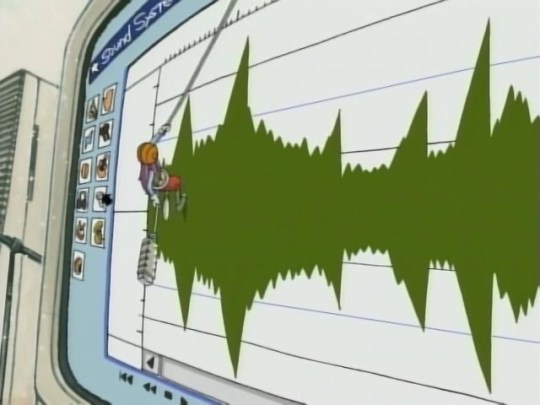
So, moving on with the series! The Giga House incident in episodes 28-29 is the first time the group works together in an organized effort, which is notable not only because it’s their first time coordinating with Ken, but also because it’s their first time properly coordinating at all. Remember when I mentioned that, back in episode 19, as much as the kids were pretty fond of each other and were great friends, they still hadn’t figured out how to actually fight as a team? Here we are, with them actually having started to figure that process out.
We then get to episode 30, where there’s actually quite a lot of interesting things to unpack.
Miyako: What's wrong with you? Daisuke: E-Eh? Mi-Miyako-san? Miyako: It feels weird when you add the "-san". Daisuke: Shut up! Man, you're all the same!
Miyako and Daisuke’s relationship is often misconstrued considering that they’re the two most chaotic in the group (their temperaments are very similar at times, which causes them a lot of friction), but I also think this blink-and-you’ll-miss it moment is pretty much their actual relationship in a nutshell. They fight a lot, and they’re ostensibly vitriolic, but they’re actually two of the most like-minded in the group -- they banter because they’re comfortable with each other. Recall that I mentioned that Daisuke is normally respectful with his elders, yet he’s the only person in the group who won’t use the -san honorific on Miyako (even though she’s the oldest)...but the one time he gets flustered and uses it on her, she tells him that it’s weird and he needs to cut that out. Or, in other words, “it’s not like you to be weirdly respectful of me like that, we shouldn’t have that kind of distance between us, stop it.”
(It’s also pretty notable that Miyako has never seriously used -kun or any other honorific on Daisuke, even right after meeting him -- the only other person she dropped honorifics on was Iori, whom she’d known prior to the start of the series, but she seems to have deemed Daisuke enough of a fellow disaster child that he merited dropping it.)
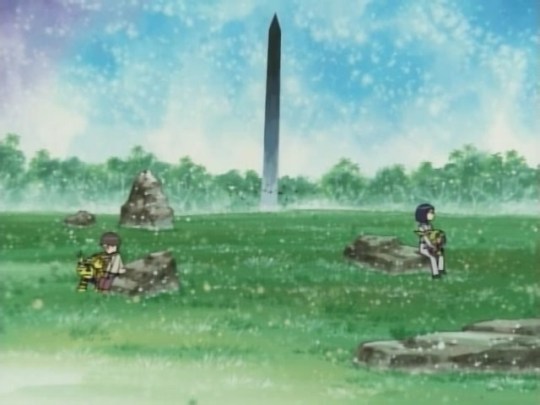
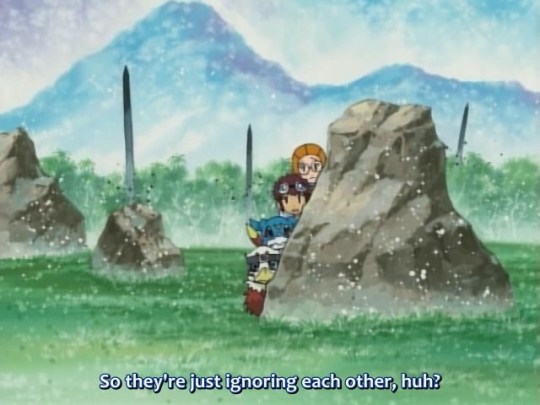
This is especially because, right after that, she recruits Daisuke into her plan to get Ken and Iori to get along -- in the end, when things really get serious, the two are incredibly like-minded (look at how in-sync they are when they scheme together).
30 is actually a surprisingly Miyako-centric episode, despite not ostensibly being one. For one, it says a lot that right now, her biggest priority is to get Ken and Iori to get along -- something that has absolutely nothing to do with herself. In episode 14, Miyako freely admitted that she had a tendency to jump to conclusions about people, and that she was shallow about aesthetics, but this is a very different Miyako from the one who harassed Daisuke for Ken’s autograph in episode 8, or immediately became distrusting of Digitamamon in episode 14. Instead, she’s simply just genuinely invested in seeing people she considers friends get along, and in a selfless manner -- one that has nothing to do with herself. She just really, really cares, a lot.
After all of the first-half hubbub of Miyako really having no idea of what to do with her emotions, the second half has her start channeling that energy into what’s always been one of her biggest strengths: checking on, connecting with, and caring about her friends. Daisuke may be an aggressive forward-thinker who can push everyone in the right direction, but unlike his predecessor Taichi, he doesn’t actually have particular charisma or leadership skills that can necessarily hold everyone together. In the absence of that ability, Miyako fills in for him, checking on the moods and feelings on everyone in the team and making sure everyone’s doing well. And that’s why she loses her temper and slaps Ken late in the episode -- because, really, she’s reached her limit on her “give him space” philosophy when he’s abusing it to be standoffish in a crisis situation, and, on top of that, she really, really did have a huge emotional investment in him.
Moving onto more Miyako in episode 31, her Jogress episode with Hikari, we get to see a little bit of the old emotionally compromised Miyako again, but -- much like the second Digimentals arc -- it involves the two of them acknowledging that both of them are not going about things the best way, and that there are things they can learn from the other.
Hikari: Miyako-san, you're a handful sometimes. Miyako: I knew that's what you thought of me... Hikari: But...I've always envied that. Miyako: Huh? Hikari: Because I can't be honest and say I'm scared or scream like you.
Miyako’s tendency to lose control emotionally results in her being insensitive much of the time, which she calls herself out on multiple times during the episode, and she can’t always be as “kind” as Hikari is -- but, on the flip side, her antics are something that can be a “light” (pun not intended) towards those who are falling in a bad mental state or into the darkness, and Hikari even acknowledges this when one of her trains of thought makes her break out into laughter. Miyako ultimately manages to get through to Hikari this way at the end of the episode, which results in a Jogress and mutual growth for both of them -- Miyako puts more thought into how to approach others (it’s pointed out at the end that she’s still thinking about understanding Ken and Hikari better), and Hikari gains more resolve and determination to fight against things instead of passively accepting her fate (she tells Takeru very directly at the end "I’m fine now. I’ll never go there again.”).
Iori and Takeru's Jogress is a little more complicated to the point where it spans multiple episodes, but a lot of it ends up having to do with the fact that the events of the BlackWarGreymon arc start really putting Iori's black-and-white principles into conflict -- it's wrong to kill something that's been proven to be alive, but it's also wrong to be evil. Putting a huge nail in that is that there's a stake in him forming a relationship with Takeru, but he doesn't really understand Takeru either -- the "two-facedness" he witnessed back in episode 19 scares even him, and he's so intimidated by Takeru that, in episode 35, he goes to approach Yamato about Takeru's past instead of asking the person directly. Takeru, hearing about this, complains that he could have just asked directly, but admits he understands why Iori did so.
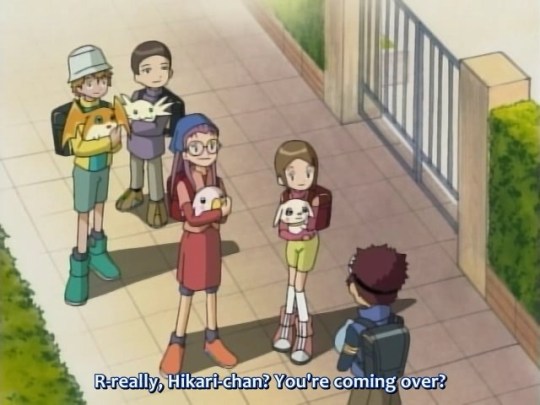
By the way, I should point out that episode 35 is the last time within the TV series that Daisuke is portrayed as having a particular interest in Hikari, and it’s just in terms of being slightly more excited that Hikari is joining his meeting. At this point, there are actual important things happening in the Digital World, and he needs to take care of Ken, too, and so...in the end, once again, Daisuke proves that he’s actually capable of putting aside those kinds of more shallow things when he really needs to.
On top of that, this is when the kids start actively working with Ken in the real world (and, if post-02 materials are any indication, continue to hang out with him even for social outings). The choice to have Ken live in Tamachi instead of Odaiba facilitated his isolation from the group during the Kaiser arc, and during around the third quarter they were all grouping up in the Digital World anyway, but the fourth quarter actually has the kids make an attempt to include Ken in their real-world outings despite the distance. Tamachi is not temporally far from Odaiba (approximately half an hour by train), but it’s a bit of a nuisance to get to, requiring crossing a bridge to/from the Tokyo mainland and paying extra for the Yurikamome. But at this point, he’s an important enough friend to them -- and them important enough friends to him -- that they’ll make it work.
At the end of episode 35, Iori finally decides -- to the point of recklessness, something that would have been previously very uncharacteristic of him -- to try and appeal directly to BlackWarGreymon to get him to stop destroying the Holy Stones so that they won’t have to fight. It’s emblematic of Iori’s heart being genuinely torn, because he’s having such a difficult time rationalizing all of these conflicting feelings. This comes to a head in episode 36, when Iori loses his temper at the rest of the group for “playing around”, but Armadimon snaps him back to reality to remind him that they’re tired and hungry, and this can’t be neglected. Iori himself ultimately becomes the one to proactively suggest that they take time to sit down and eat, indicating that -- little by little -- he’s starting to shift his thinking a bit, after being so incredibly stubborn for much of the series.
This is what leads to Iori and Takeru’s Jogress at the end of the episode, now that Iori is flexible enough in thinking to understand the emotional id behind Takeru’s mentality. And likewise, Takeru’s started to loosen up by 36, too --
Takeru: Sure, darkness is frightening, and we would feel at ease if we could get rid of it completely, but I'm sure that's impossible. Ken: Impossible? Takeru: Where there's light, there's always darkness. Hikari: The brighter the light, the darker the shadow, right? Takeru: Yes. That's why I think it's important not to lose sight of the light inside you, no matter how dark it is.
The thing about Takeru is that while he deceptively seemed more open and playful than Hikari for most of the series, he was actually bottling up a lot of emotions in a way not entirely different from the way she did. (Note how, despite how tied at the hip the two constantly are, they almost never actually talk about their thoughts on each other; it feels like a relationship where they implicitly trust each other but are practically reliant on that implicit trust to maintain that close of a friendship at all.) And he’s been keeping those emotions bottled up until they exploded in less-than-healthy ways, initially distancing himself from Iori. But being a lot more open about his thoughts on the matter allowed them to connect better, and eventually Takeru came to embrace a somewhat more reasonable stance on the matter after observing Iori.
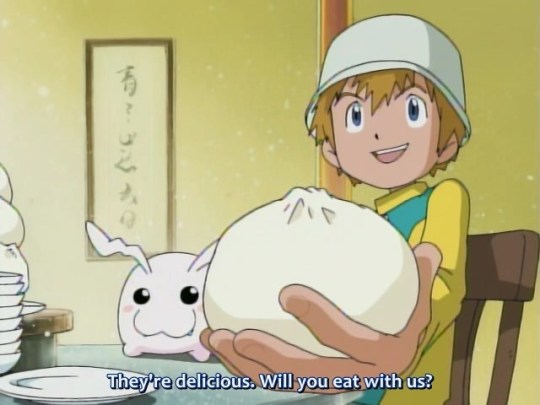
It also doesn’t seem like coincidence that this is the episode that ends with Takeru’s first major act of goodwill towards Ken.
This leads into episode 38, the Christmas episode. Fun things to note!
The episode opens with Daisuke and the other younger kids giving a “Christmas present” to their seniors in the form of letting them reunite with their partners. Remember how I said that the 02 kids always admired their seniors and looked up to them? Even this late in the series, the series does not shy away from the fact you’re supposed to see the 02 kids as their deferential juniors.
The Christmas party is, of course, notably, the first major moment of reconciliation between Iori and Ken, with Iori having gone through major harsh lessons about morality in the last few episodes, and Ken opening up more to the rest of the group. Said party is also yet another notable example of how much of a priority it is for the 02 kids to be “social life friends” and not just friends working as a Digimon incident team -- after all, having genuinely emotionally present friends is what Ken needs most in his life right now, considering that the party is treated as the first time he’s been truly happy in a long while.
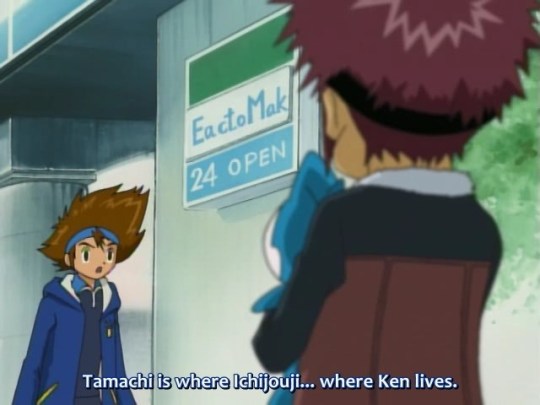
This is followed by episode 39, which is notable as the time when Daisuke finally commits to switching to given-name basis for Ken, and actually opens the episode standing against Taichi -- because he's so worried about Ken that he needs to go join him. This is something that's lost a bit in translation, but although Daisuke stands down against Taichi, he's not rude nor does he overstep his boundaries with his respected senior (he even opens his statement in polite-form Japanese) -- he's just saying, firmly and politely, "I'm sorry, but I can't go, I have to go help my friend." It’s a notable moment because while Daisuke has been becoming increasingly assertive and aware of what he really wants to do, this is the first time we’re actually seeing him refuse to defer to the very senior he’d spent so much of the series idolizing and looking up to.
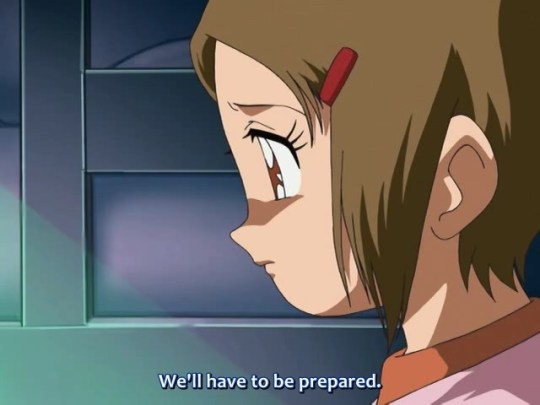
We get to episodes 43-45 (the Demon mini-arc), which is also the culmination of the 02 kids having to face the limits of pacifism. This tends to throw off people who are coming in from Adventure, since the Adventure kids ended up killing Digimon with a lot more ease in the original series, but it’s also important to make note of the fact that the episode itself deliberately portrays a gap in mentality between the Adventure and the 02 kids -- with Hikari torn between the two. It also creates an interesting subversion of expectations when Hikari, the one you’d expect to be more on the pacifist side, is the one who’s already accepted that it may be inevitable, whereas Miyako, the more aggressive and belligerent one, is the one staunchly against it.
The reason for this “paradox” comes out of a single line from Hikari in episode 44:
Hikari: You’re the one who saved him, Miyako-san.
The Adventure kids never liked killing. They were never enthusiastic about it -- it was just that they were almost immediately put in a situation where the entire fate of the multiverse was at stake thanks to some unambiguously evil Digimon who wanted nothing but wanton destruction. Even then, it was pretty clear that they never enjoyed it -- Takeru professed a desire to avoid fighting in Adventure episode 12, and the pacifist Mimi went through a breakdown in Adventure episodes 45-50 trying to avoid casualties. But one of the most important lessons Mimi learned at the time was that pacifism has its limits -- there’s no point if it ends up in more deaths than it saves, because at that point you’re adhering to moralistic principles more than you’re actually saving lives.
The fact that the Adventure kids and the 02 kids have a “different mentality” isn’t just happenstance, but outright embraced. Daisuke, Miyako, and Iori never had to actually deal with a conscious Digimon that was unambiguously evil for most of the series, and Archnemon revealing that her motives were pretty much nothing but wanton destruction in episode 29 was the first major warning signal to Iori that his pacifism might have limits. And during this Demon mini-arc, it’s not like these Digimon are threatening multiverse destruction or anything -- it really does seem like a constant “glimmer of hope” that maybe, just maybe, they can save people non-lethally. Alas, they can’t.
Daisuke, being someone who’s inherently practical-minded, starts entertaining the idea that push may come to shove as early as episode 25, and finally makes his first statement about practical limits in episode 43. But the more emotionally caught-up Miyako and Iori end up taking another episode to swallow it, and they don’t take it well. Most of the attention in 44 is given to Miyako, and it reconfirms that, despite her aggressive exterior, she’s emotionally sensitive and empathetic -- and while killing LadyDevimon is framed as truly the only thing that could have been done in that situation, Miyako is not faulted for being emotionally compromised, nor is Iori likewise when he faces a similar situation with Takeru and is forced to confront the people whose lives were at stake.
Episode 45, when Ken opens the gate to the Dark Ocean, doesn’t really have much to add on top of what’s already there, but this is basically “the point of no return” when everyone confirms their own emotional investment in Ken and understanding that he’s not just reformed, he’s genuinely struggling under the pain of what’s been happening -- and this is before they find out about the truth behind the Dark Seeds, and that Ken’s transformation into the Kaiser may have been supernaturally influenced, too.
It’s also interesting to see the different ways each kid reacts to Ken as they support him:
Hikari, the most outwardly compassionate, goes to support him the second she notices him in physical pain; Takeru notices that it might work, realizes Ken needs the support, and joins.
Iori and Miyako reflect on how Ken’s putting all of his efforts in, and lambast themselves before joining. Interestingly, given the circumstances behind what’s happened up until now, Iori and Miyako criticizing themselves take a different meaning -- Iori, who’d been scornful of Ken until recently, seems to be regretting that he distrusted him when Ken had been trying so hard, while Miyako, who had been open to him since episode 25, seems to be upset that she’s sitting there and not doing enough when he’s in all of this pain.
And Daisuke, of course, the most “forward-thinking” of them all, gives Ken a speech about what he’s done so far and reminds him that he’s already done more than enough for “atonement” -- which is, of course, what directly reaches Ken the most.
And when we get to episode 46, and the kids, now knowing about the Dark Seeds, hold a roundtable (and emotional support group) to discuss what to do about the Dark Seeds, Daisuke’s the one with the most spirit and energy about it, but...
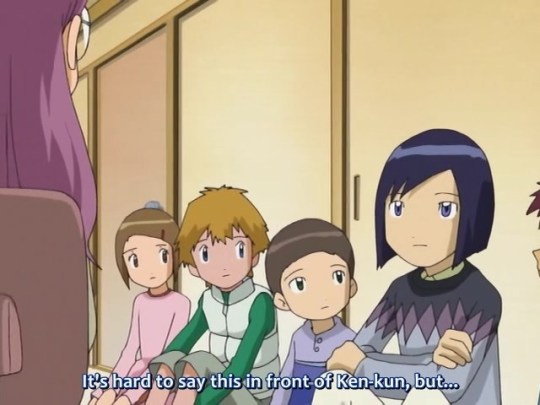
...the one actually leading the roundtable? Miyako.
Miyako: Sorry, that's all I can think of. Ken: Please don't worry about me. Miyako: (nods)
It’s subtle, but the scene in question does actually make a deliberate move in indicating that Miyako’s continuing to channel her emotional sensitivity and desire to go out of her way to help Ken -- of course, they all know how traumatic this is for him, but she’s the one who’s actively calling attention to how he must feel about it first and foremost.
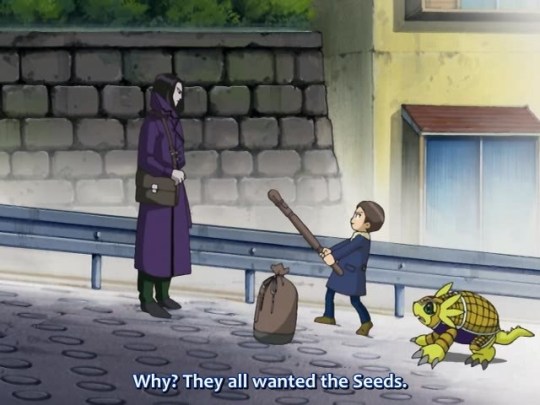
Episodes 47 and after end up becoming yet another major wake-up call for Iori (seriously, I do not understand why people claim he had no character arc when this wasn’t even remotely subtle) when he learns that Oikawa, whom he’d pinned as “evil”, has a deep relationship with the father he’d grown up idolizing so much, and it completely flips his world around -- even though he had started to get a bit more open-minded, he’s still trying to rationalize what should have been, in his mind, two diametrically opposite things. It fuels his confusion and desperate desire to understand more, not just about Oikawa, but about everything he’d thought about morality and why people turn to evil.
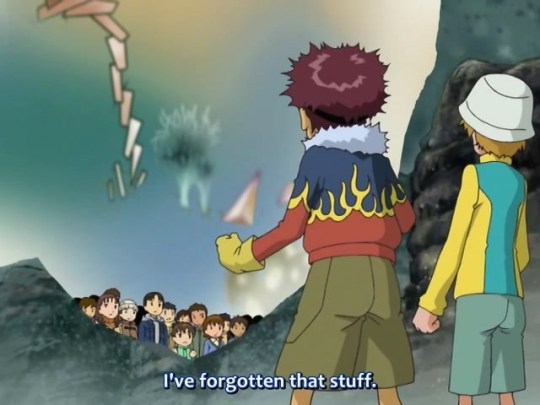
So we get to the final arc of the series, and it involves a confrontation with BelialVamdemon -- but said finale is heavily dependent on talking to the Dark Seed children and inspiring hope back into them. This results in a conversation where everyone talks about their career dreams, and Daisuke admits that he wants to be...a ramen chef, which completely blindsides even his friends.
What’s with this arc?, you might think. And moreover, why is Daisuke ending the series still kind of an idiot? Even Miyako still seems to be a bit of a mess and chaotic. Weren’t they supposed to be growing into dignified heroes, like Taichi and his friends were last series?
Well, here’s the thing -- the fact that the 02 kids end the series comparatively “undignified” is actually very inherent to the core theme of 02 itself. There were more than enough episodes that established that said kids are heroic in their own way -- caring about others, fighting on others’ behalf, and learning important lessons about what’s important to fight about. That doesn’t mean they don’t get the right to continue being disaster children while they’re at it.
Why?
Let’s look at a few official statements behind the creation and intent behind 02 as a series. From producer Seki Hiromi, from the Digimon Animation Chronicle:
That came from an idea I had while reading a newspaper article. I read a story about a nine-year-old boy going to Columbia University, and I thought, “This boy is going to college because he’s considered a genius, and everyone around him will be in their twenties, and he won’t get to have any friends his age. What kind of life would this boy end up having?”
Or some very interesting statements from head writer Yoshimura Genki from the 02 Blu-ray box:
When I was writing Ken Ichijouji, the main idea for him I used as a basis was the conflict between “the self that has to be a well-behaved child when adults are watching” and “being able to be oneself”, and the pain that came from it as a result. So for instance, in the same way as the Pinnocchio fairytale, or the short story A.I. that was adapted into a movie, or many other works, there are probably universal worries that all children feel as they grow, but also, there were ongoing unimaginable, atrocious incidents happening with children at the time, and perhaps it was those social conditions that gave me a hint on what to do. I think I had some thoughts that I wanted to convey to the children who were living through that time. I was given the opportunity to put those kinds of feelings, as much as I liked, into episode 23, and I am truly grateful to all of the staff, including the director. ... Also, this is about Daisuke’s character, but I believe I paid particular attention to making him “a child who could be himself”. He has no special talents, and although he’s clumsy and scatterbrained, I wanted him to be someone whose strength was in his straightforwardness, and wrote him that way.
Lying underneath the entirety of 02 itself is a theme about “children who are not allowed to be children”. Or, in other words, the pressure placed on children to be “talented” and “dignified” and “well-behaved”, often imposed on them by well-meaning parents who are unfortunately taking the opportunity to stroke their own ego, robbing them of the happiness and mental freedoms they should have as kids.
Ichijouji Osamu and Ken, who were placed under the pressure to be “genius children” and cracked under the pressure to please their parents. Oikawa Yukio, who was cut off from the Digital World in childhood by a well-meaning Hida Chikara, worried about his son getting into “foolish” talk. The Dark Seed children, who also fell victim to similar pressures that Ken did, and lost hope for life unless they could force themselves into that mold.
Takeru: If you want the Digimon to exist, if you believe in that, they will. Just like our feelings...Just like every child having the power to make their dreams come true. Keiko: That's just childish. Daisuke: You all have dreams for the future, don't you? Noriko: Dreams for the future? Takashi: I've forgotten that stuff. Daisuke: No way! You must have one! Takeru: It's nothing to be ashamed of. Takashi: Then, what's your dream? Daisuke: Mine? Mine's a ramen shop. I love ramen! I'll become the world's best ramen maker! Ken: I had no idea... Noriko: Well...actually, I wanted to be a kindergarten teacher. Hikari: Me too. Daisuke: What about you guys? Takashi: A baseball player! Keiko: I really want to be a pastry chef. Hiroshi: When I said I wanted to be a manga artist, everyone laughed, so I gave up... Takashi: We all had aspirations, and at some point we thought that wasn't allowed...But we were wrong, right? Daisuke: Let people say whatever they want! Noriko: You're right, we should be free to dream. Miyako: Not just dreaming. If you work hard, your dreams will surely come true!
Notice something about all of these careers mentioned? They’re all the kind of “overly childish” “wild dream” “undignified” “too simple” kinds of dreams that an average parent might be uncomfortably quick to shoot down because that’s “not good enough”. These are the kids who willingly accepted the Dark Seeds; they, much like Ken, probably grew up under parents who prioritized school performance and other “societally dignified” things that ended up eating away at their happiness.
02 has a lot of different themes, but the one that lies in its undercurrent from start to finish is “so why does a child have to be this way? As long as they still understand what’s important, do they have to be dignified people? Why can’t they just be free to have dreams and be themselves?” And Daisuke and his friends are there specifically to stand up against this mentality, and to remind Ken and the other victims of it that it doesn’t have to be this way -- that it’s okay to be your true self, and be a child, and not succumb to all of those arbitrary, shallow standards people put on you. Even if that means you’re still a bit of a chaotic disaster at the tender age of eleven.
Digimon, in the Adventure and 02 universe, have always been treated like a part of the self (they were literally conceived as a physical manifestation of the soul), but in 02 they gain an extra meaning of representing “the inner, deepest part of yourself that represents your wildest ‘childish’ dreams”. The symbolism of Ken spending the first half of the series trying to reject Wormmon for being “weak” -- in other words, rejecting his own kind-hearted self for not being the kind of “strong” entity he was pressured and groomed into being -- is not lost, nor that of the Dark Seed children gaining partners when they reconnect with their dreams and wishes, nor Oikawa finally, finally meeting his partner when he comes into contact with the past he’d really lost (and especially not the fact that his attempt to reclaim shallow reminders of said childhood involved trying to make his own Digimon).
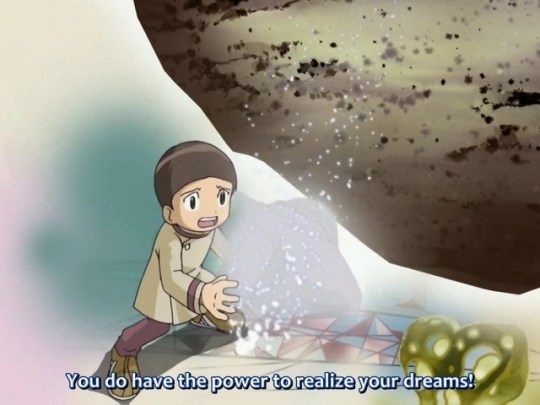
And notably, the series’s finale (prior to the epilogue) ends not on Daisuke but on Iori, escorting Oikawa to the Digital World despite how completely impossible it would have been for early-series Iori to even entertain the idea, finally coming to truly understand what happened with him and being most personally impacted by his death.
But in any case, where are we with the characters? We’re here to talk about how they’ve grown and developed over the course of the series. Let’s recap:
Daisuke: Started off the series as an abrasive kid with more bark than actual bite, constantly deferring to others and easily deflating, relying on shallow sources of validation like wanting attention from Hikari; gradually gained an ability to identify what was important and put his foot down for it, embraced his forward-thinkingness to reach out to a heavily troubled child as a friend, and ended up surrounded by a friend group that loves and respects him.
Miyako: Started off the series as a shallow, flighty girl with poor control over her emotions and difficulty in appreciating the gravity of things; came to channel her emotional range into empathy for others and compassion, bringing other people together and taking care of them.
Iori: Started off the series as a straight-laced but too principled child who stuck to “rules of what’s right” not only in morality but also in way of acting; started to appreciate the emotional nuances and heart behind why people do what they do and how it’s possible to be more flexible in “doing good”.
Ken: Well, his character arc is pretty obvious, but -- again, while his arc of learning to forgive himself is well-known, less often pointed out is that it centers very heavily on not only having penance but also not being too hung up on the past, and the futility of drowning in self-pity and regret instead of choosing to take responsibility and act more productively going forward.
Takeru: Started off the series as a seemingly mature but deceptively inscrutable character whose duality made him hard to approach; eventually opened up with the help of others and showed a capacity for being more flexible with his personal grudges.
Hikari: Started off the series emotionally repressive and passive to the point of self-destruction; eventually embraced connections with her other friends and became more active in taking a stand for herself.
Hey, not bad!
And, again, this is not a series you should be reading in terms of “self-awareness” in the same way Adventure was, but in the sense of their “relationships” and how they interact with others. By being less abrasive and more assertive, Daisuke gained the respect of his other friends. By putting her emotional capacity into caring about others, Miyako became someone who holds the group together. By learning to think a little more flexibly and be less stubborn, Iori arrived at a position where he could more easily sympathize with others in the group. Takeru and Hikari both moved from their previously relatively inscrutable positions to ones who could more effectively interact with and open up to others. And Ken, of course, became someone who managed to integrate himself into a group of true “friends” despite everything he had done against them in the first half.
This, in the end, is how you get what’s one of the tightest friend groups in Digimon history. In the end, the relationships themselves are almost like characters of their own that got development -- I say very often that you could take two of the characters and have an excellent scope of how they’d interact and play off each other by the end of the series. And although they end the series as possibly one of the most shameless, undignified disaster groups out there...they’re certainly still heroic, and in any case, given the lessons they learned throughout their own series, they probably wouldn’t have it any other way.
251 notes
·
View notes
Text
On being fictionkin and hating source (or just having a "shitty" kintype)
There seems to be this misconception with kff that a kintype either stems from any of the following: a piece of media you are a fan of, a character you are a fan of, or simply a character who exhibits traits either you have or want. That if someone just so happens to have a kintype from a dubious source, they too are a dubious person because oh we can choose our kintypes. Why would you choose something terrible? Right? None of these are right and come from a foundational misunderstanding of fictionkin. Do people tend to find comfort in source? Sure. But for others like me, most likely not. Simple put I hate Homestuck. I am a noncanon Beforan troll, and I hate Homestuck. Just because I am fictionkin does not mean that I am required to enjoy or contribute to the source via fandom or otherwise. This is something that has left me feeling othered by the community. Many fictionkin just love talking about their sources because I mean It Is Them, but no matter how many times I read Homestuck I just could never enjoy it. The writing wasn't for me, typing quirks kinda got annoying after 8000 pages, and I mean there's just other webcomics I personally enjoy more. You know for something which is supposed to have a major impact on me (kintype), it's just not a major part of my life. This does not diminish however my connection to Liekxa, to the troll aspect of me. In fact, I love troll culture! But it is personally important to distinguish me discussing content from an fictionkin perspective rather from a fan perspective. How does this affect other people? I have seen multiple blogs just state that they're fiction and leave it at that. Some of it is for privacy, but I have noticed that for some it's out of shame. KFF have brought with them the notion that source is chosen and have destroyed any sort of nuance that came with accepting you might stem from something problematic but are not inherently so. I mean otherkin don't have a free pass for being shitty either, so why is it (slightly) more respected in community for non-fictional based lives to be a little "problematic" but fiction must be shunned. Before anyone gets the wrong idea, I am not encouraging the lack of critical consumption and thinking for otherkin. The point I am trying to make is that there are unfair standards we have to abide by for lives we do not live anymore simply because an author was cancelled or a piece of media depicted terrible things.
Let people not be their source! I really think it's backwards that we automatically tack on associations and stereotypes purely by source alone. Someone stating that they are sang-woo or a villain shouldn't make you wary, nor should they have to worry about how the community should treat them. They should be able to discuss memories without assuming that they would act on it again, or that in some capacity they still retain the negative traits associated with the character. When we say that this is an involuntary identity, it means that for the love of whatever is out there, we genuinely do not choose if our previous lives were rather unsavory (if you're spiritual*). However, in this life, we can choose to be good people.
* I should note I am writing this from a spiritual perspective and do not have experience with psychological kintypes outside of my headmates. However, the same should generally hold up, and if you judge people based off of kintypes idk what to say to you other than mature a little would ya?
21 notes
·
View notes
Text
2020 blog update
Hello. No idea if any of you ‘remember’ me but I do seem to have a fair few followers on here. I managed to access the login information for this account and it is safe to say this blog is dead. I denounce everything I stood for on this stupid shit.
I’m writing this because it’s what the blog deserves. Not looking to be dramatic, not looking for sympathy, in fact I think i’ll get a bit of backlash for this but bring it on.
The past and the present- a summary
I had this blog when I was 14, unfortunately way too young to have a social media presence (one which carried any responsibility like this one anyway). No matter what age I said I was, no matter how I portrayed myself or how you, my followers interpreted me, I was a sad young trans guy desperately hoping to look big, cool, masculine and stoic, and that manifested in the most toxic way possible.
I’m 17 now, still very very young, and after developments in my life, especially pursuing my medical transition and becoming happy within myself, I no longer hold such toxic beliefs as I once did. I am happier with myself and no longer feel the need to sacrifice others’ dignity, respect, and unfortunately sometimes on this blog, privacy, for my own. I was a very insecure, stubborn, and ignorant teenager, who dealt with a lot of denial. I’m not blaming the way I treated people online on other factors, but of course external factors came into play. I was dealing with bullying and insecurity, with parental problems, and with loneliness and depression. I seeked some sort of community, and I wanted to push myself away from the ‘weak’ trans community (the way I viewed it at the time). I wasn’t in denial personally, with the fact that I was trans (being gay is a different story- I was in complete denial with the fact that I’m gay), more just with the way other people viewed me (I will expand on this). I could elaborate on the way in which I viewed other people and the way that projected onto my conduction online, but it is a complex and confusing story. I have completely changed my viewpoint on trans ‘discourse’, I am open minded, I am close friends with people I would have turned my ignorant nose up at years ago. I am so proud to say that I am a completely different person now. I grow every day, it seems, and I can assure that I will never return to this ignorant mindset.
Growth
With experience, I have grown too. Obviously, from 14-17 i have become more mature. I have different experiences now as well, for example, I don’t bind often at all really anymore, because its more comfortable and can sometimes make me more dysphoric to know I am binding. I’m bringing this up because I bet you back when I was active on this blog, I would’ve laughed at the more mature, tolerant me, and probably went on a tyrade about how I was a fake trans guy or less of a man for not binding. I often wonder what ‘old me’ would think of ‘new me’. Now obviously, three years isn’t a hell of a big difference, but to a 17 come 18 year old it is. I understand I am not an adult yet, but I’ve always taken pride in conducting myself with a sense of maturity and articulacy, and for this post and platform especially I feel it is appropriate.
The Truscum Mindset
Back when I ran this blog, I was in an echo chamber of like minded people, which didn’t help my ideological development. I watched youtubers like Blaire White and Kalvin Garrah, who I thought gave me a balanced, moderate, and fair opinion which is clear is not the case. Back then I would’ve scoffed at the idea of Blaire and Kalvin and other similar people as being radical or a gateway, but I urge you, if you feel you are slipping to obsession with those ideologies, to seek to widen your opinions and associations. I understand it’s a fairly niche discourse topic, but for me it opened a wider rabbit hole into the alt right. From wanting to fit into the lgbt and wider communities as a masculine male, this opened up the black hole of the alt right, I browsed (now deleted) subreddits and 4chan boards, and forums that put me in a very negative and dangerous place. If you’d like me to make a post elaborating on this, I am more than happy to, but this post is to address conservativetranny.
Denial and owning up to responsibility
Back in 2017/18, I was very much in denial of certain aspects of myself, especially my sexuality. I am gay. I thought that this was, and especially as a trans guy, a demasculating quality. I still deal with those feelings sometimes, as a lot of young gay guys do, but thankfully it does not manifest itself as toxic as it once did. I just wanted to portray myself online as how I thought I wanted to be viewed-I didn’t want to be viewed like ‘any other trans guy’. I wanted to be different, but now I can appreciate individuality and I can also embrace being trans as well.
I used to think that having alt views was the coolest thing ever, which contributed to my slip into the alt right, something on which I’ll elaborate on in later posts. I am now an advocate for deradicalisation, and being rational, truly rational. I’m also an advocate for maturity and owning up to your mistakes.
I have hurt people, especially in my personal life, throughout my time as a stupid, thoughtless immature teenager and i am sorry, from the bottom of my heart, for that. I now respect the hell out of those people and unfortunately, but definitely rightfully so, they have lost their respect for me. I don’t blame them, because as I said, up until very recently I was a horrible, toxic person. With maturity, in the past half a year I have been able to own up to my mistakes and I am now taking responsibility for that. No excuses, because I was a shitty person. Of course there is a line between excuses and justification, and I hope those which are reading this can distinguish and appreciate this difference.
Self Hatred and Truscum
Back when I ran this blog, it was very easy to tell I was self hating. Everything I wrote on here, pretty much, was hateful except for the odd two posts that were about something unrelated to my ideology. I was extremely dysphoric and in a bad place when I wrote these things and certainly projected my insecurities onto others. I wanted to find a community of different thinking people that would accept me, and this community was certainly the wrong turn. I had a feeling that it was wrong at the time, but I was too naive and cowardly to own up to it and seek a way out. I kind of just naturally fell out of it, a a lot of things happened in my personal life in late 2018 that forced me out of trans discourse and into much more toxic places like the alt right and true crime fandoms, and I think I’ve only recently ‘found myself’ in the past year or so. I might make a post on self growth on the future as I intend to keep this blog to elaborate and voice my opinions on deradicalisation and highlight the importance of owning up and self awareness.
Don’t fall into the rabbithole
I’m not too acquainted with trans discourse anymore, so I’m out of the loop on this one, but I’d imagine that there’s still ‘transmed vs tucute’ ideas. Kalvin Garrah’s community comes to mind, I haven’t watched his videos ‘as a fan’, if that makes sense, for a while now but I am aware he has a large fanbase of young trans teens that were in a similar mindset to where I was back when I ran this blog. I would love for this post to reach his opposers and supporters for that matter, as a means to show them that they don’t have to fall into this cycle of hate which can be very damaging. I used to be an avid fan of Kalvin, and Blaire White, amongst others. I watched exclusively their content alone and formed my opinions around theirs. If you’re doing that now, I urge you to consider other people when you do. Think about the people like Brennan Beckwith, people who were severely impacted and hurt by hateful rhetoric. Those people are human too, and with maturity you will learn that people with different experiences and views are, at the end of the day, the same as you, and they have feelings as well .I’m going to make a post in the future about Kalvin Garrah, certainly, but maybe Blaire White as well.
Why now?
You may be wondering why this post is being made now of all times, and that is a question that has every right to be asked. I feel as if this timing is right because I finally possess the level of maturity needed to own up to my mistakes and tell you that I was wrong and it was certainly wrong to post those opinions and mistakes online for all to see, and put people in my real life on blast like I did.
I had completely forgotten about this blog, and forgot about the rude and ignorant words I had written towards the people in my real life, until chance had it that I was in contact with one of the people mentioned in this post. [https://conservativetranny.tumblr.com/post/169351517511/no-one-pretends-to-be-trans]
I’m not going to go into the nuances of the conversation we had, but it turns out they had, for a while and definitely rightfully so been hurt by the fact that I had mentioned them, by name, in this post. And while I’d of course still like to keep these people anonymous and will not sacrifice their anonymity in order to tell a story or ‘save myself’, this post is quite funny to read back on as I am good friends with the people referred to as ‘P’ and ‘Shadow’ now.
This is the end of this post, as I feel I have said everything I have wanted to say regarding my previous conduct on this blog. I’m going to change my name on this blog and my bio as I do intend on further posts in the future. I’m not sure how many people, if any, this post will reach, but I’m satisfied I have written this anyway. I certainly do plan on writing future posts but I’m not exactly sure how to formulate them. But thank you so much for reading this far, and if you have, I appreciate it.
#truscum#transmed#ftm#trans#dysphoria#kalvin garrah#kalvin garbage#terf#deradicalisation#i have literally no idea how to tag this#tucute#do people even say that anymore lol
35 notes
·
View notes